#pillars of Iman
Text
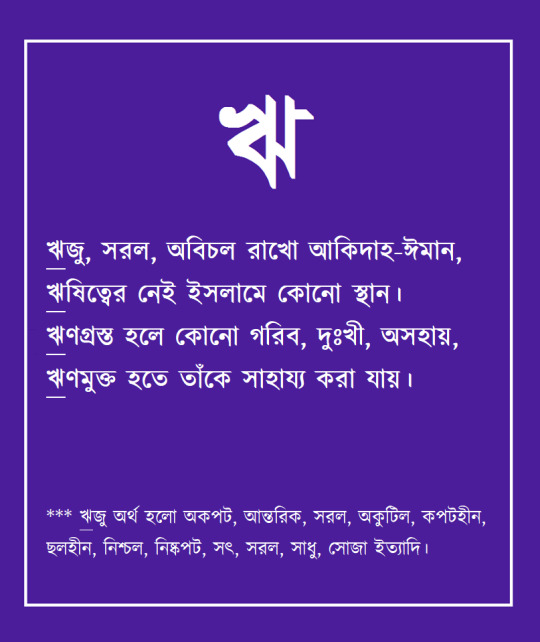
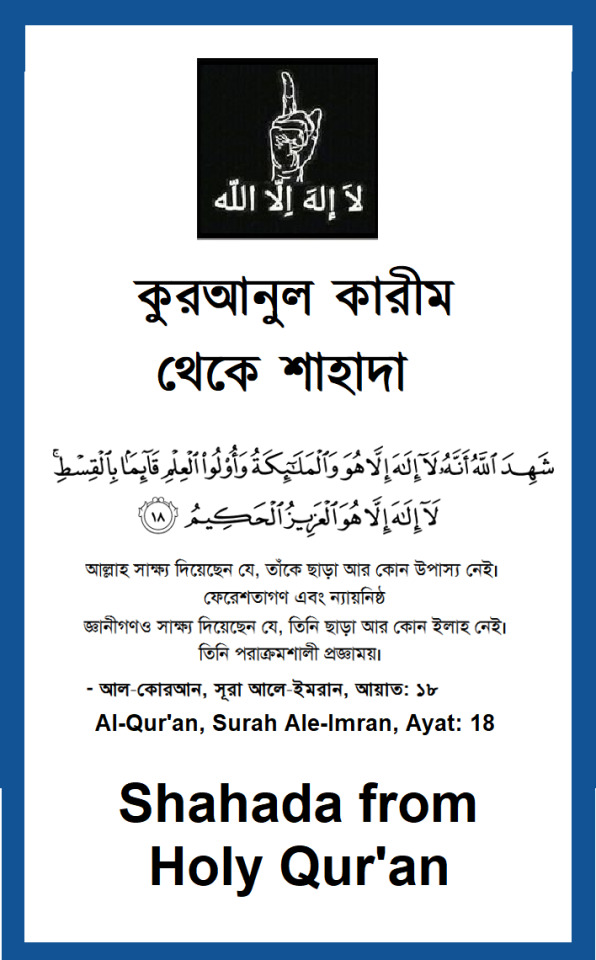
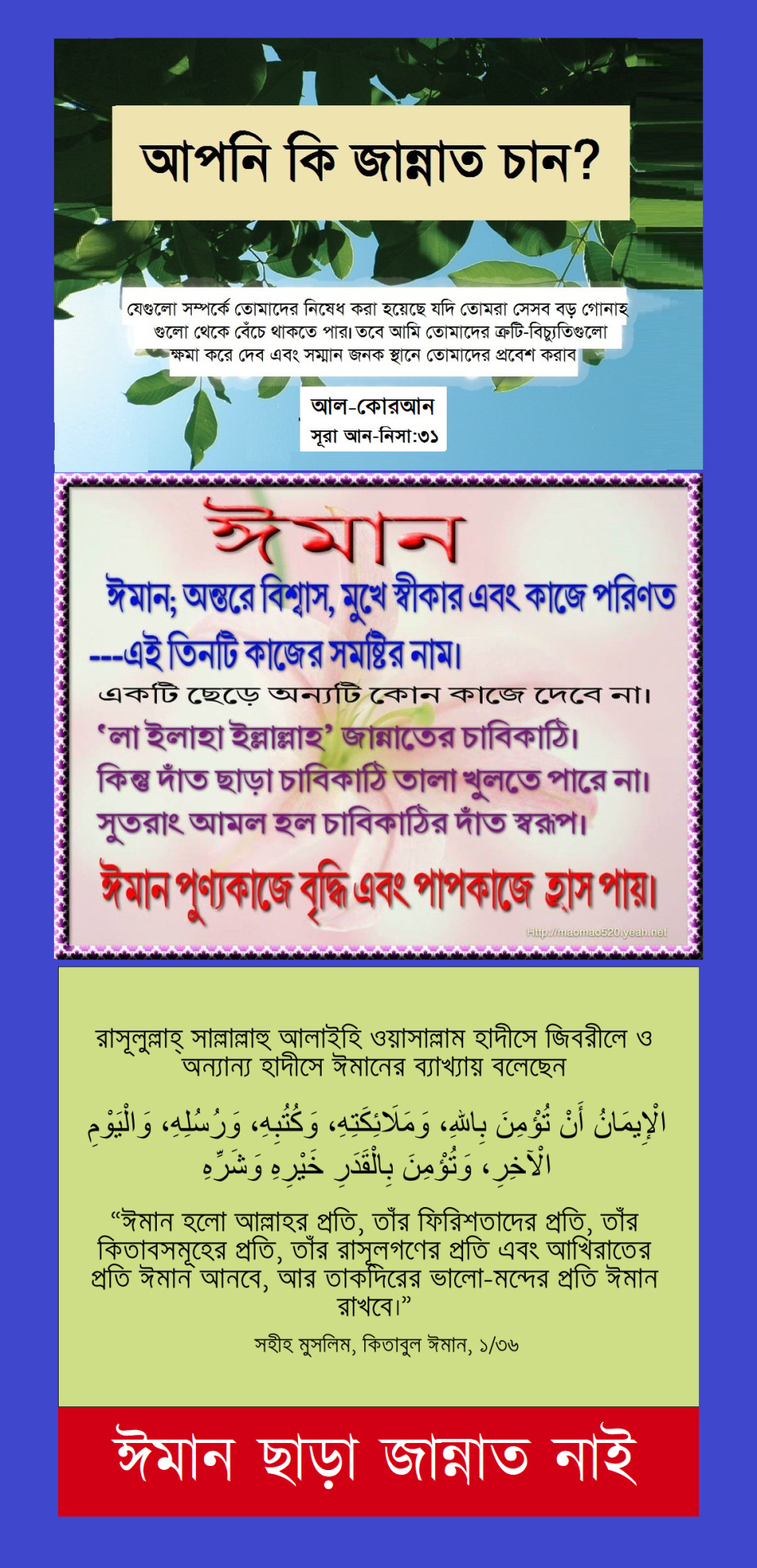
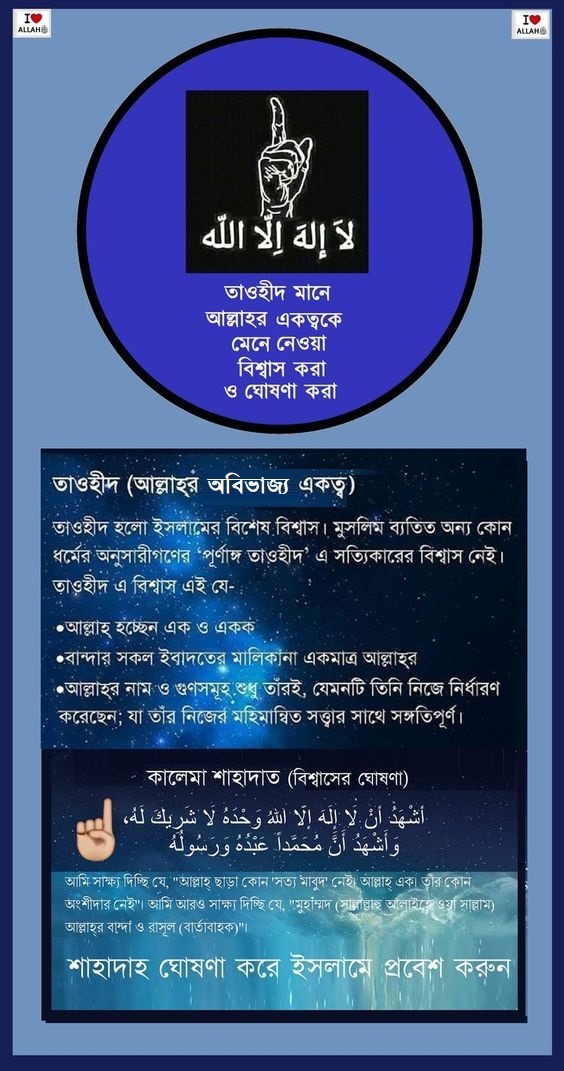
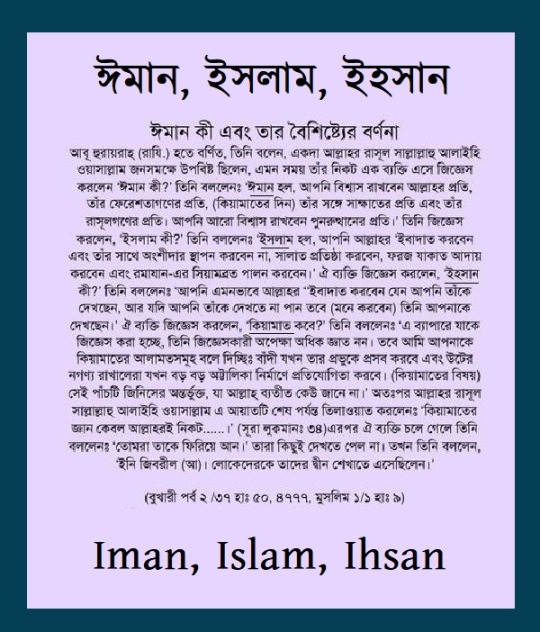
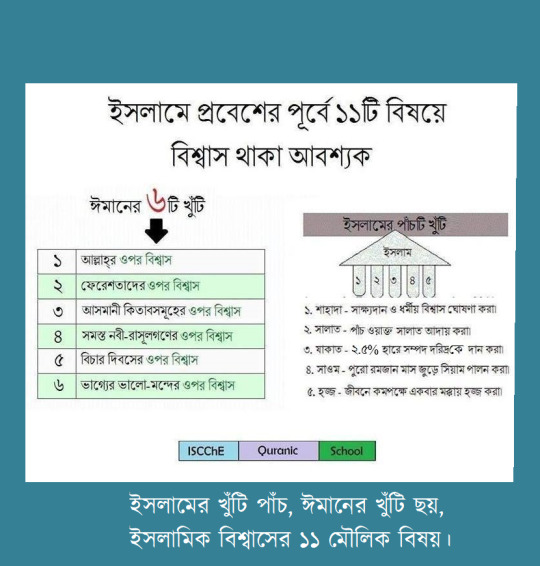


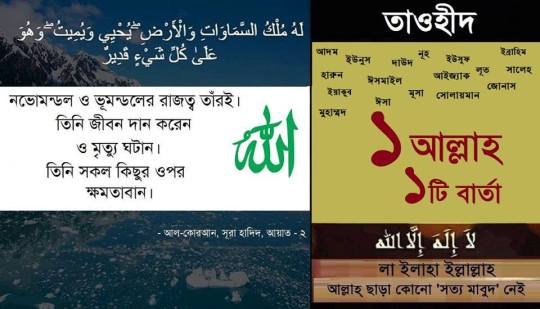

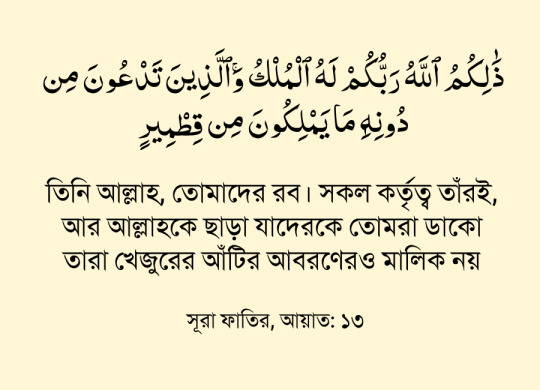

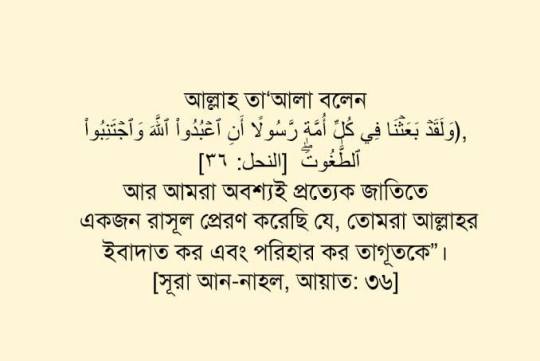
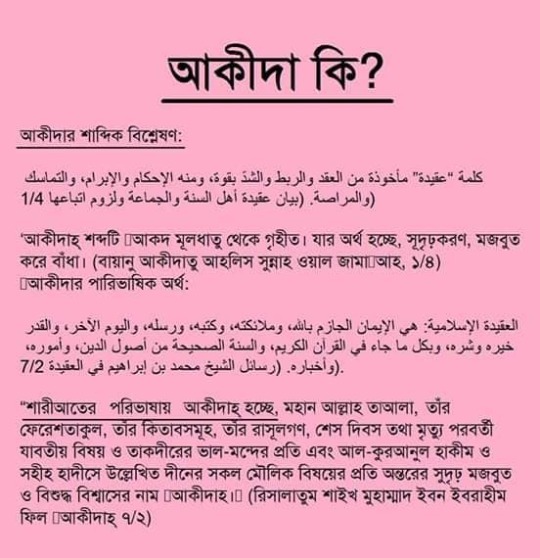
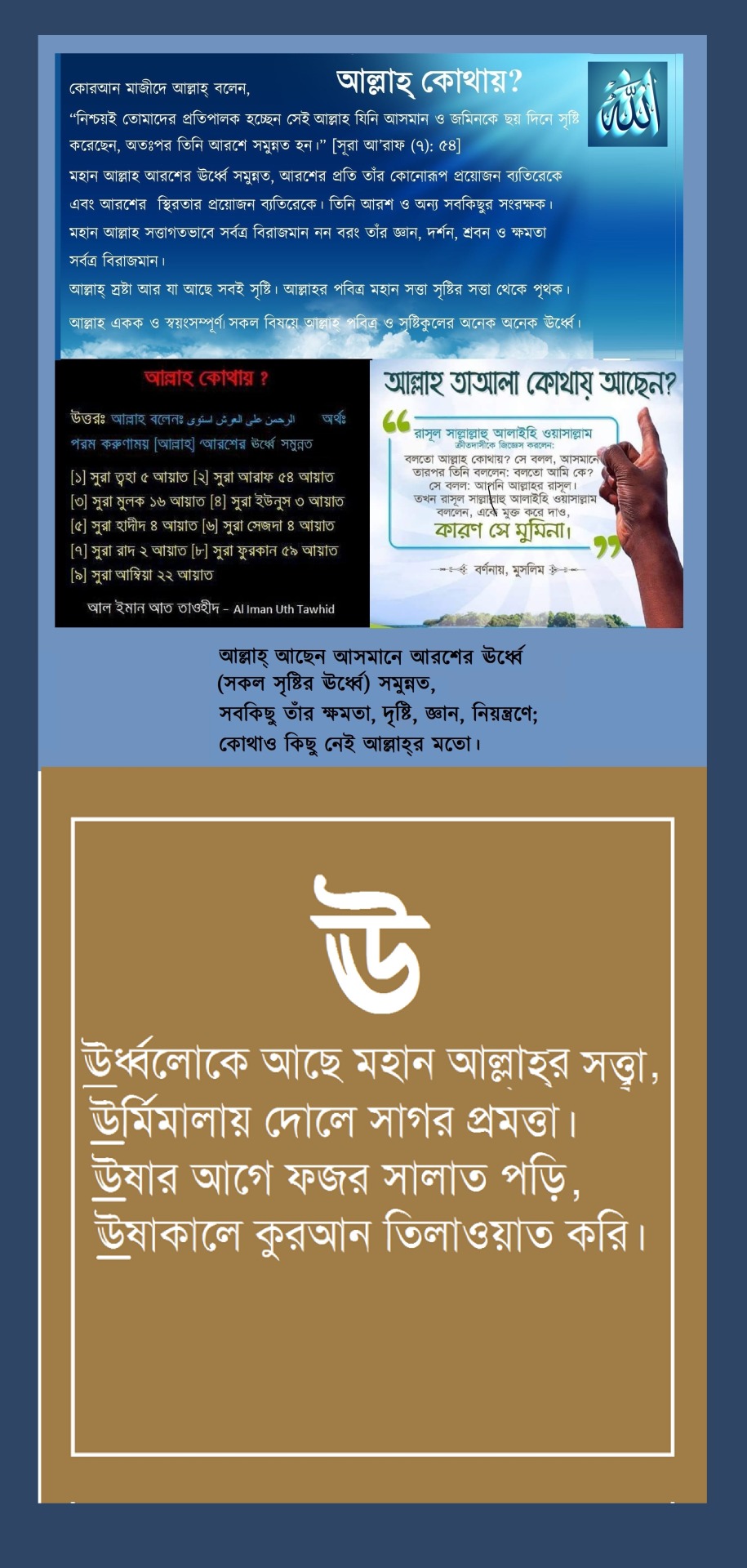
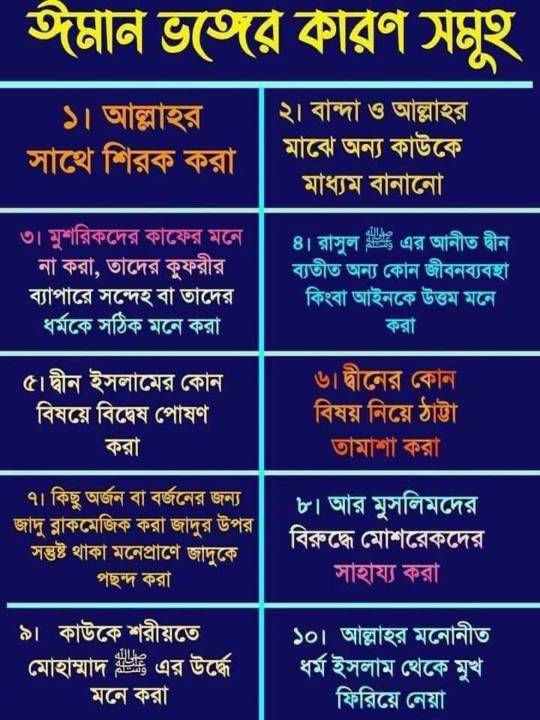
ঋজুতা রাখব আকীদায়-ঈমানে
ঋজুতা রাখব আকীদায় ঈমানে
keep uprightness in faith
Aqidah
আকিদা ( আরবি: العقيدة–আল্-আকিদাহ ; বহুবচন: العقائد–আল-আকা'ইদ ), যা ইসলামি ধর্মতত্ত্ব নামেও পরিচিত, হল একটি ইসলামি পরিভাষা, যার অর্থ 'কিছু মূল ভিত্তির উপর বিশ্বাস স্থাপন'। বিশ্বাস বা ধর্মবিশ্বাস বুঝাতে মুসলিম সমাজে সাধারণত দুইটি শব��দ ব্যবহৃত হয়: ইমান ও আকিদা।
Iman
ঈমান (إِيمَان 'ঈমান', শাব্দিক অর্থ প্রচলিতমতে বিশ্বাস, মতান্তরে স্বীকৃতি) শব্দের আভিধানিক অর্থ স্বীকার করা, স্বীকৃতি দেওয়া, অনুগত হওয়া মতান্তরে দৃঢ় বিশ্বাস করা। এটি কুফর বা অস্বীকার করা বা অবাধ্যতার বিপরীত। ইসলাম ধর্মে ঈমানের অর্থ অত্যন্ত ব্যাপক।।
ইমান শব্দটি আমনুন মূল ধাতু থেকে নির্গত। যার অর্থ -বিশ্বাস করা, আস্থা স্থাপন করা,স্রীকৃতি দেওয়া,নির্ভর করা, মেনে নেওয়া ইত্যাদি। ইসলামি পরিভাষায়, শরিয়তের যাবতীয় বিধি-বিধান অন্তরে বিশ্বাস করা,মুখে স্বীকার এবং অদনুযায়ী আমল করাকে ইমান বলে।ইমানের পরিচয় সম্পর্কে রাসুলুল্লাহ (স.)বলেন- ইমান হচ্ছে আল্লাহ, তাঁর ফেরেশতাকুল কিতাবসমূহ, রাসূলগণ, পরকাল এবং ভাগ্যের ভালো -মন্দের(ভালো -মন্দ আল্লাহ তায়ালার পক্ষ থেকেই হয়) প্রতি বিশ্বাস স্থাপন করা।(মুসলিম)
ঋজুতা রাখব আকীদায় ঈমানে
Keep uprightness in faith
#akidah#pillars of iman#ঋজুতা রাখব আকীদায় ঈমানে#keep uprightness in faith#ঋজুতারাখবআকীদায়ঈমানে#ঋ#ঋজুতা#আকীদা-#ঈমান#আকিদা#ইমান#uprightness#belief#faith#Iman#Aqidah
0 notes
Text
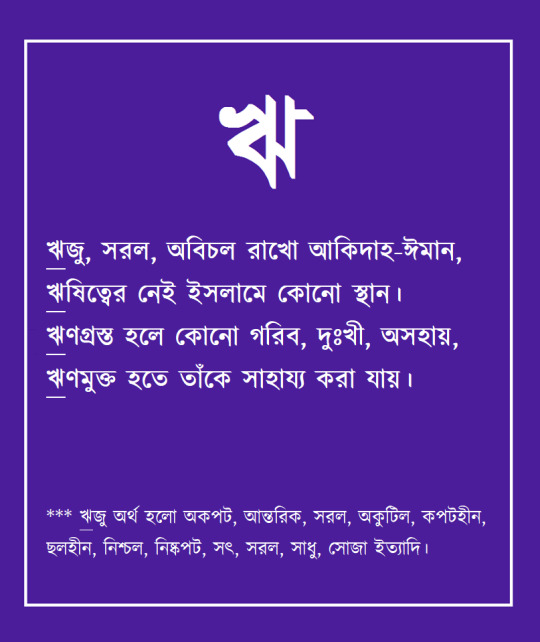
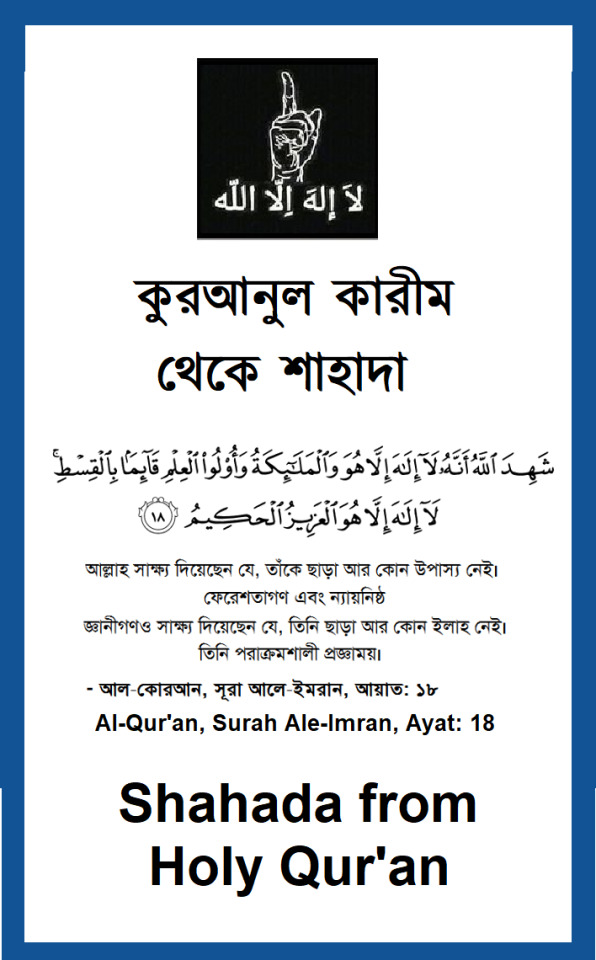
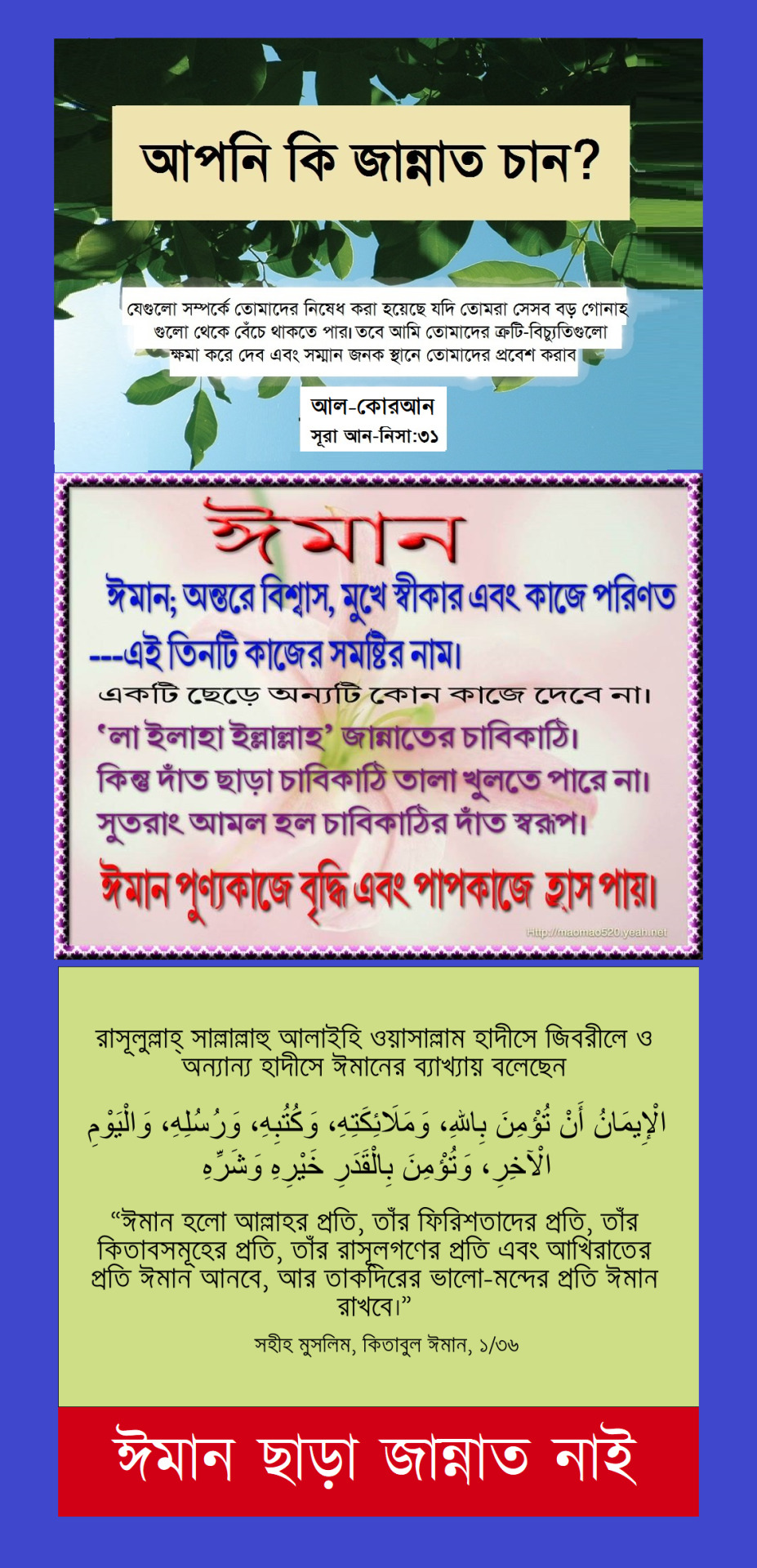
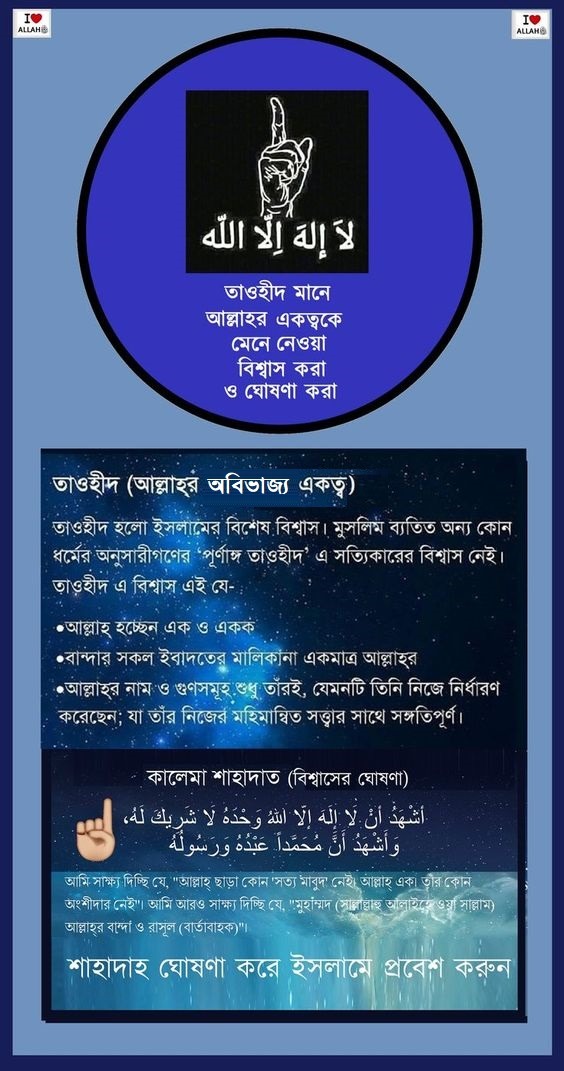
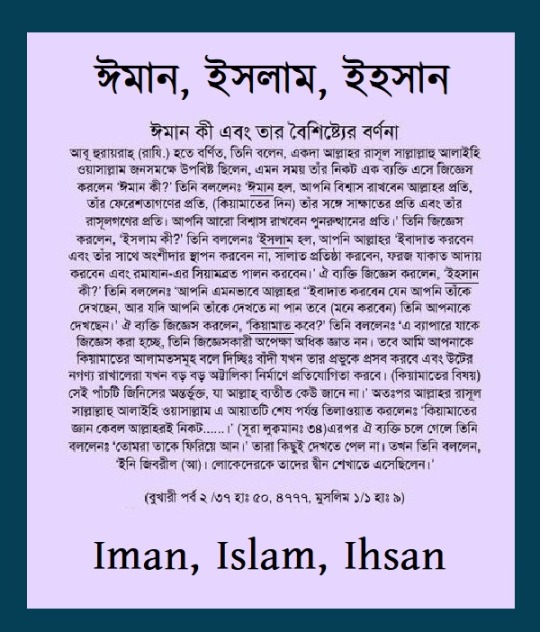
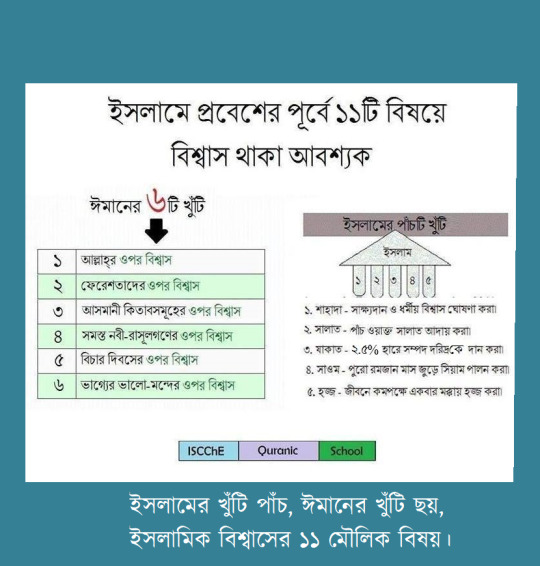


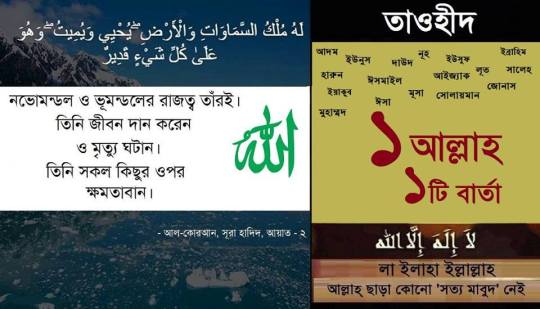

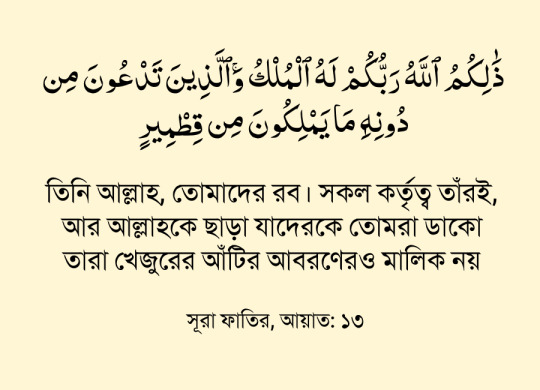

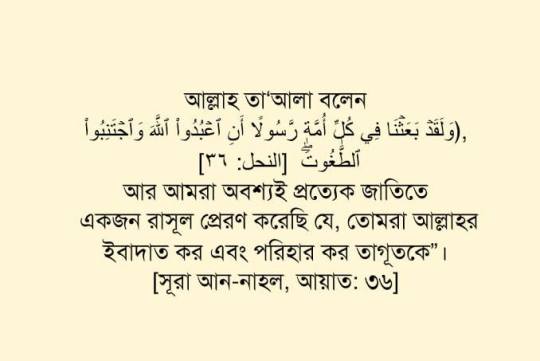
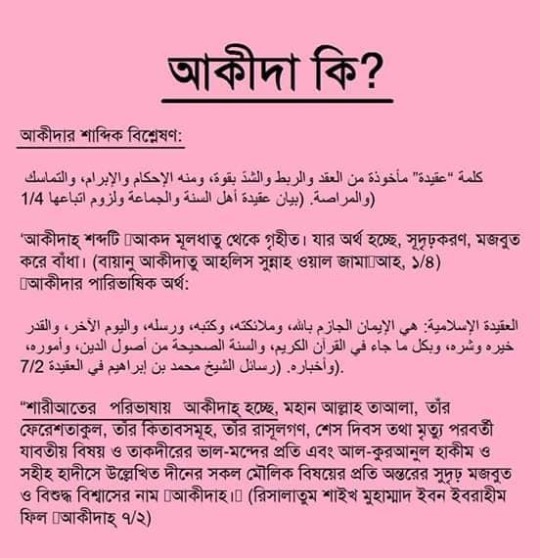
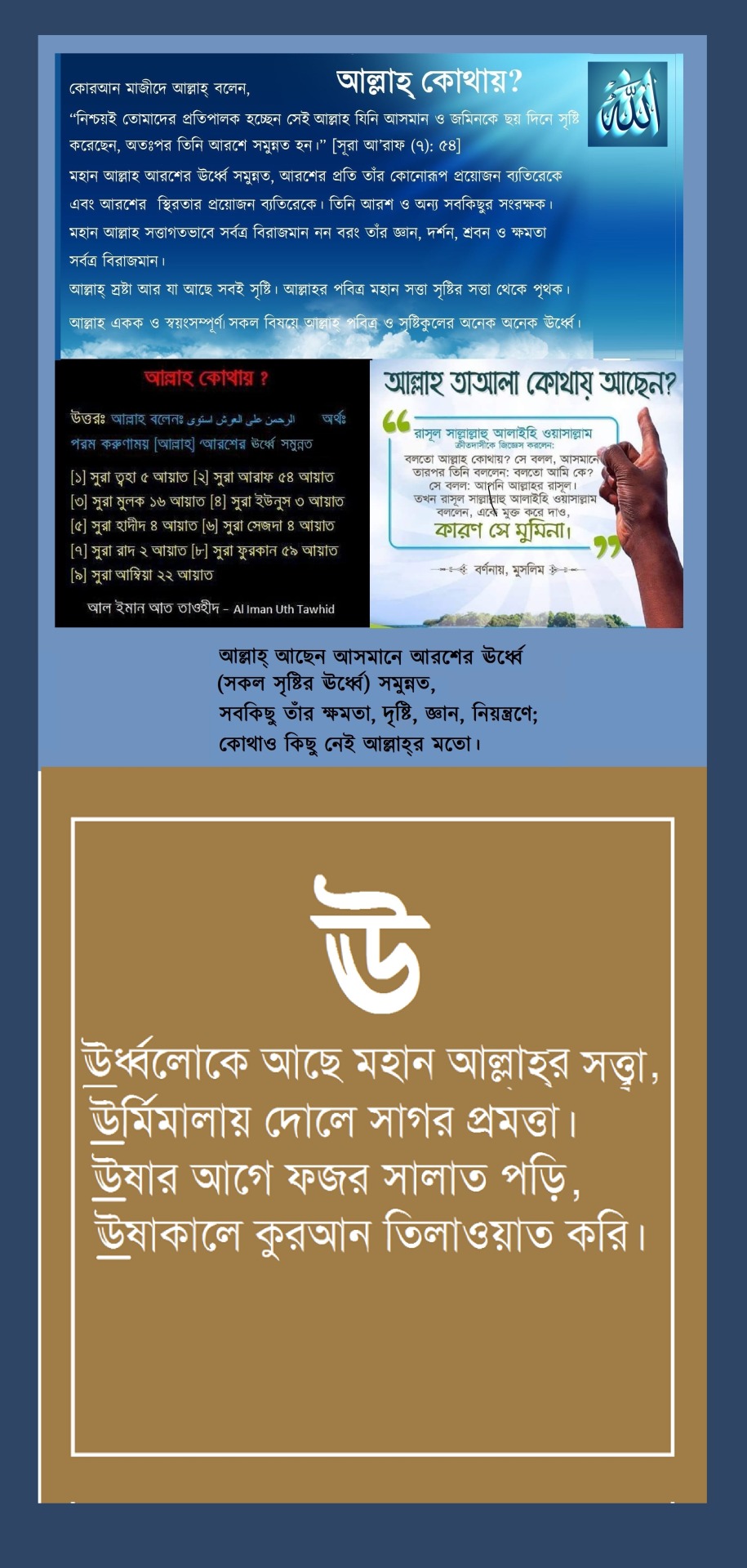
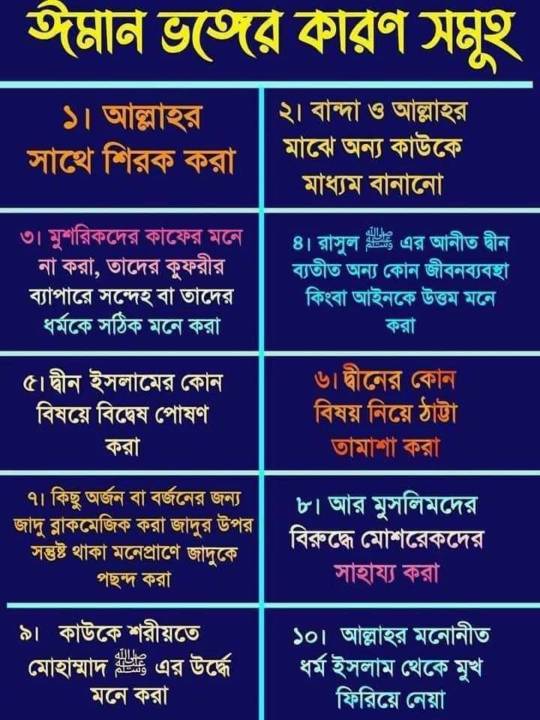
ঋজুতা রাখব আকীদায়-ঈমানে
ঋজুতা রাখব আকীদায় ঈমানে
keep uprightness in faith
Aqidah
আকিদা ( আরবি: العقيدة–আল্-আকিদাহ ; বহুবচন: العقائد–আল-আকা'ইদ ), যা ইসলামি ধর্মতত্ত্ব নামেও পরিচিত, হল একটি ইসলামি পরিভাষা, যার অর্থ 'কিছু মূল ভিত্তির উপর বিশ্বাস স্থাপন'। বিশ্বাস বা ধর্মবিশ্বাস বুঝাতে মুসলিম সমাজে সাধারণত দুইটি শব্দ ব্যবহৃত হয়: ইমান ও আকিদা।
Iman
ঈমান (إِيمَان 'ঈমান', শাব্দিক অর্থ প্রচলিতমতে বিশ্বাস, মতান্তরে স্বীকৃতি) শব্দের আভিধানিক অর্থ স্বীকার করা, স্বীকৃতি দেওয়া, অনুগত হওয়া মতান্তরে দৃঢ় বিশ্বাস করা। এটি কুফর বা অস্বীকার করা বা অবাধ্যতার বিপরীত। ইসলাম ধর্মে ঈমানের অর্থ অত্যন্ত ব্যাপক।।
ইমান শব্দটি আমনুন মূল ধাতু থেকে নির্গত। যার অর্থ -বিশ্বাস করা, আস্থা স্থাপন করা,স্রীকৃতি দেওয়া,নির্ভর করা, মেনে নেওয়া ইত্যাদি। ইসলামি পরিভাষায়, শরিয়তের যাবতীয় বিধি-বিধান অন্তরে বিশ্বাস করা,মুখে স্বীকার এবং অদনুযায়ী আমল করাকে ইমান বলে।ইমানের পরিচয় সম্পর্কে রাসুলুল্লাহ (স.)বলেন- ইমান হচ্ছে আল্লাহ, তাঁর ফেরেশতাকুল কিতাবসমূহ, রাসূলগণ, পরকাল এবং ভাগ্যের ভালো -মন্দের(ভালো -মন্দ আল্লাহ তায়ালার পক্ষ থেকেই হয়) প্রতি বিশ্বাস স্থাপন করা।(মুসলিম)
ঋজুতা রাখব আকীদায় ঈমানে
Keep uprightness in faith
#akidah#pillars of iman#ঋজুতা রাখব আকীদায় ঈমানে#keep uprightness in faith#ঋজুতারাখবআকীদায়ঈমানে#ঋ#ঋজুতা#আকীদা-#ঈমান#আকিদা#ইমান#uprightness#belief#faith#Iman#Aqidah
0 notes
Text
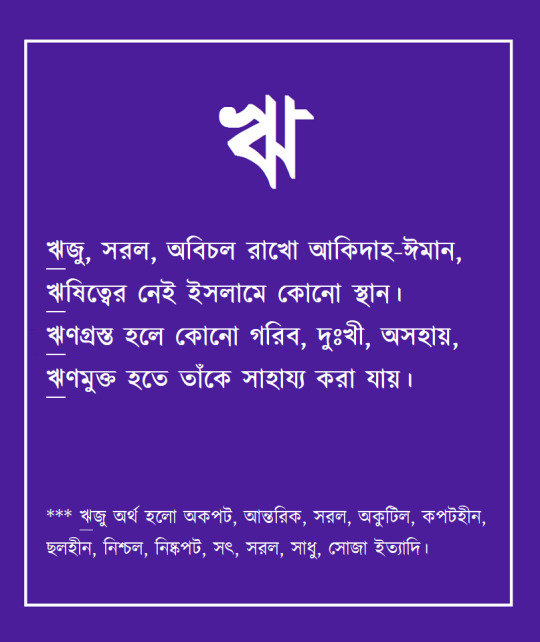
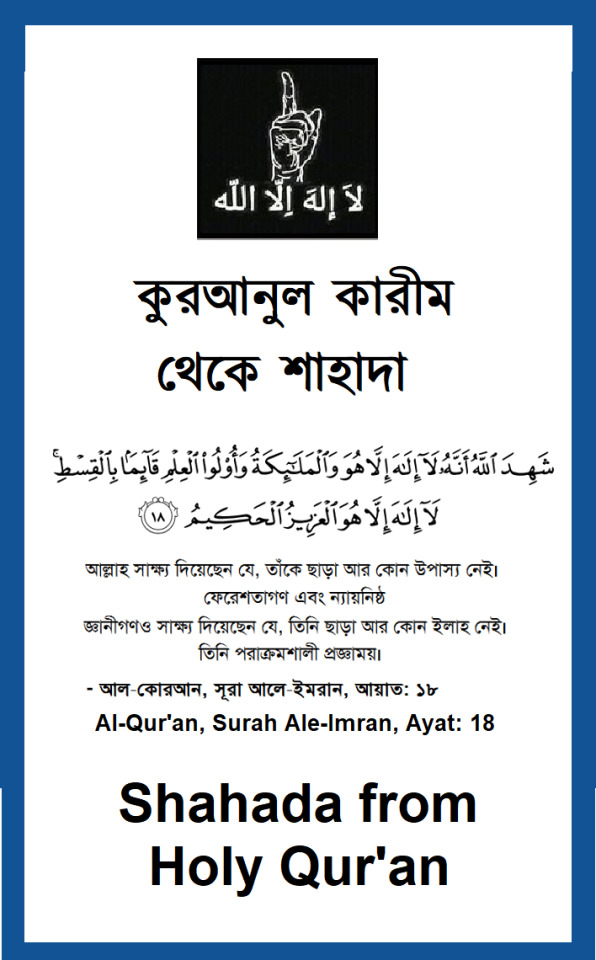
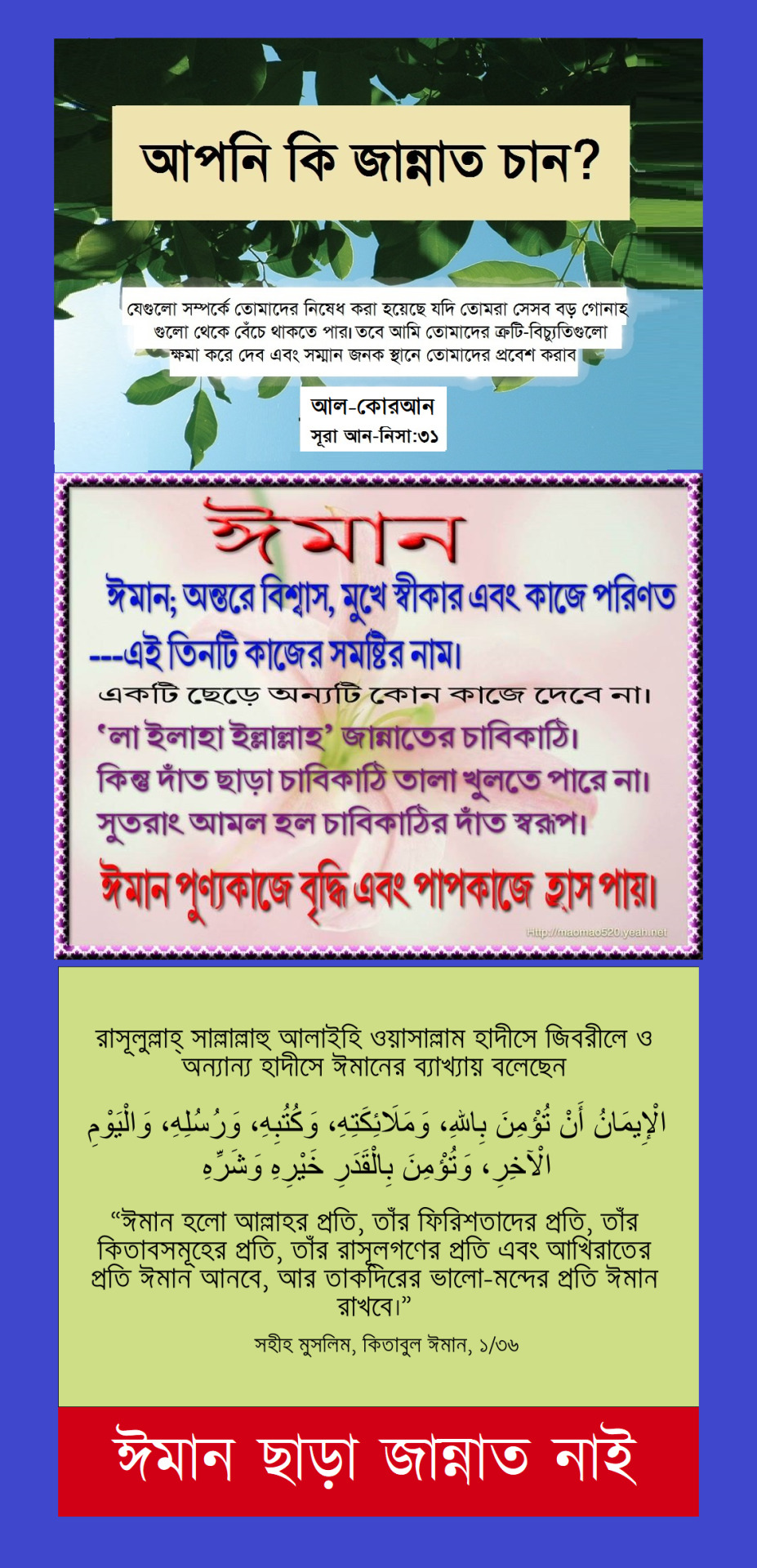
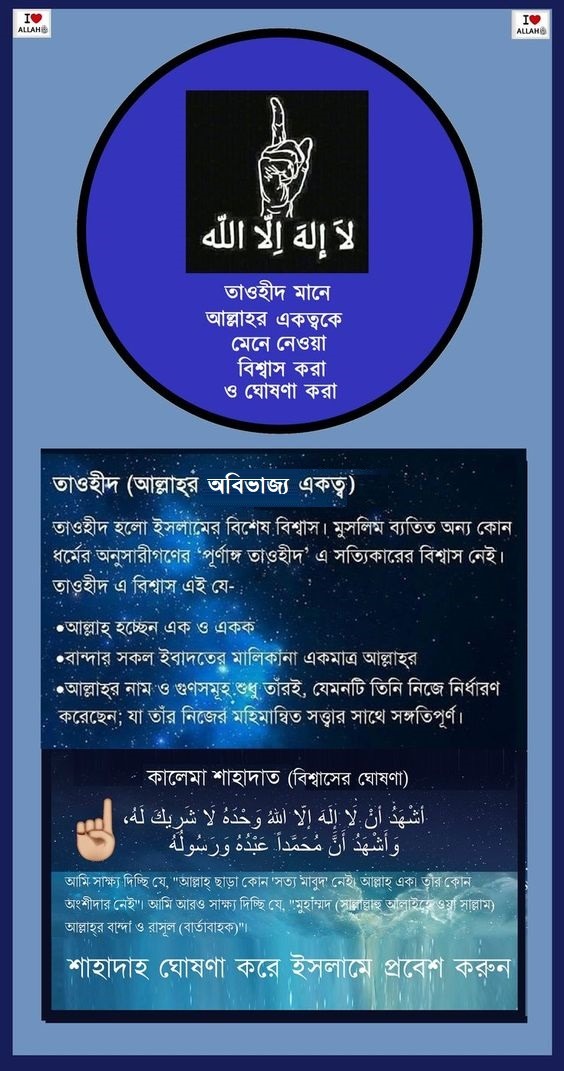
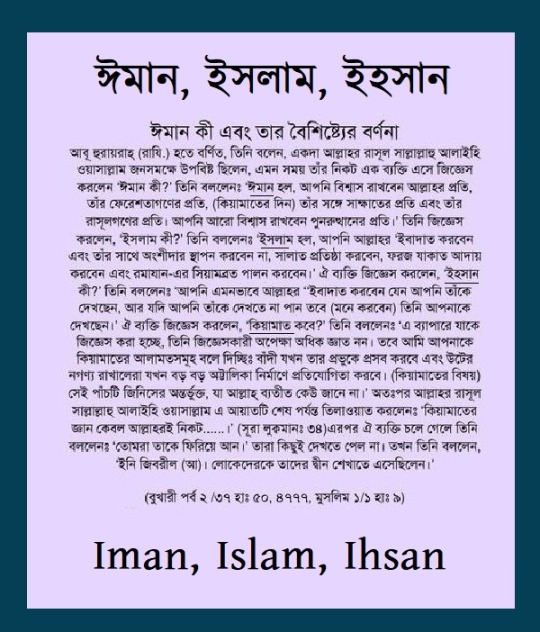
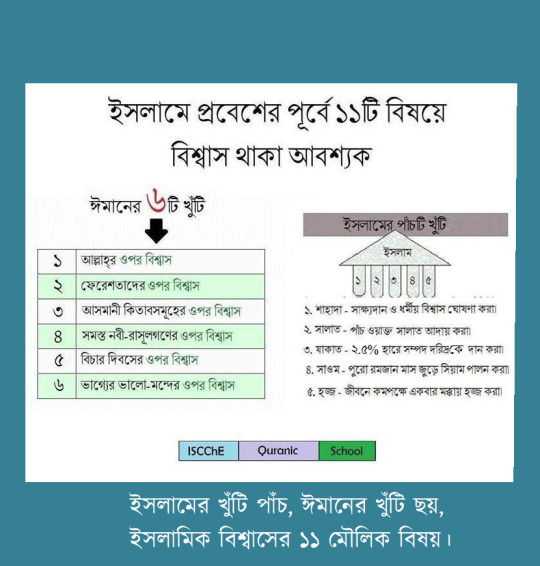


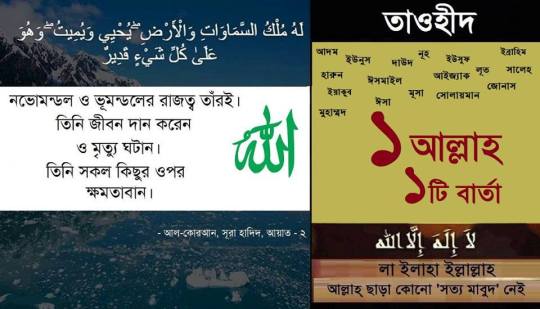

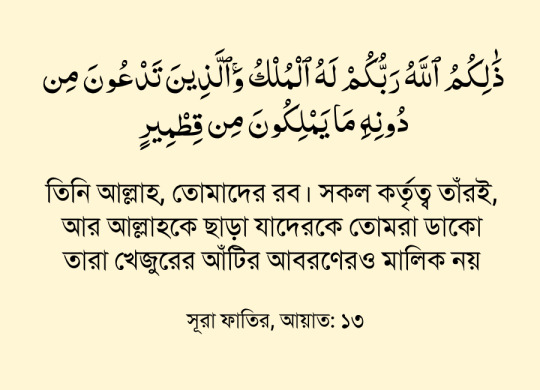

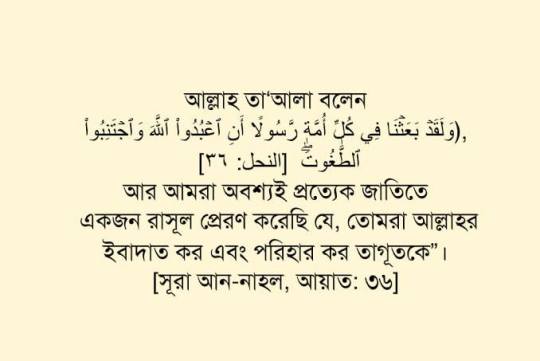
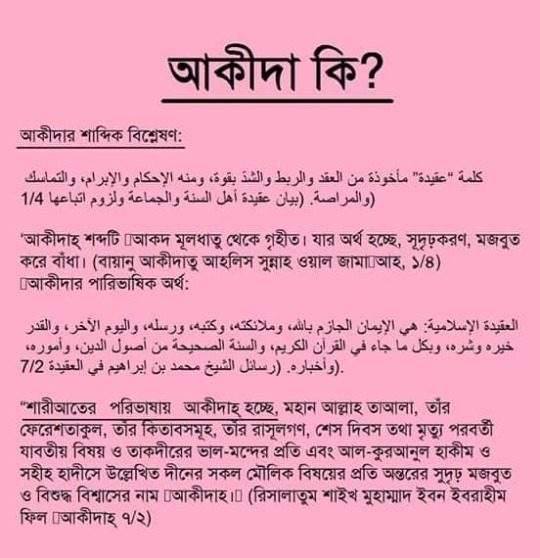
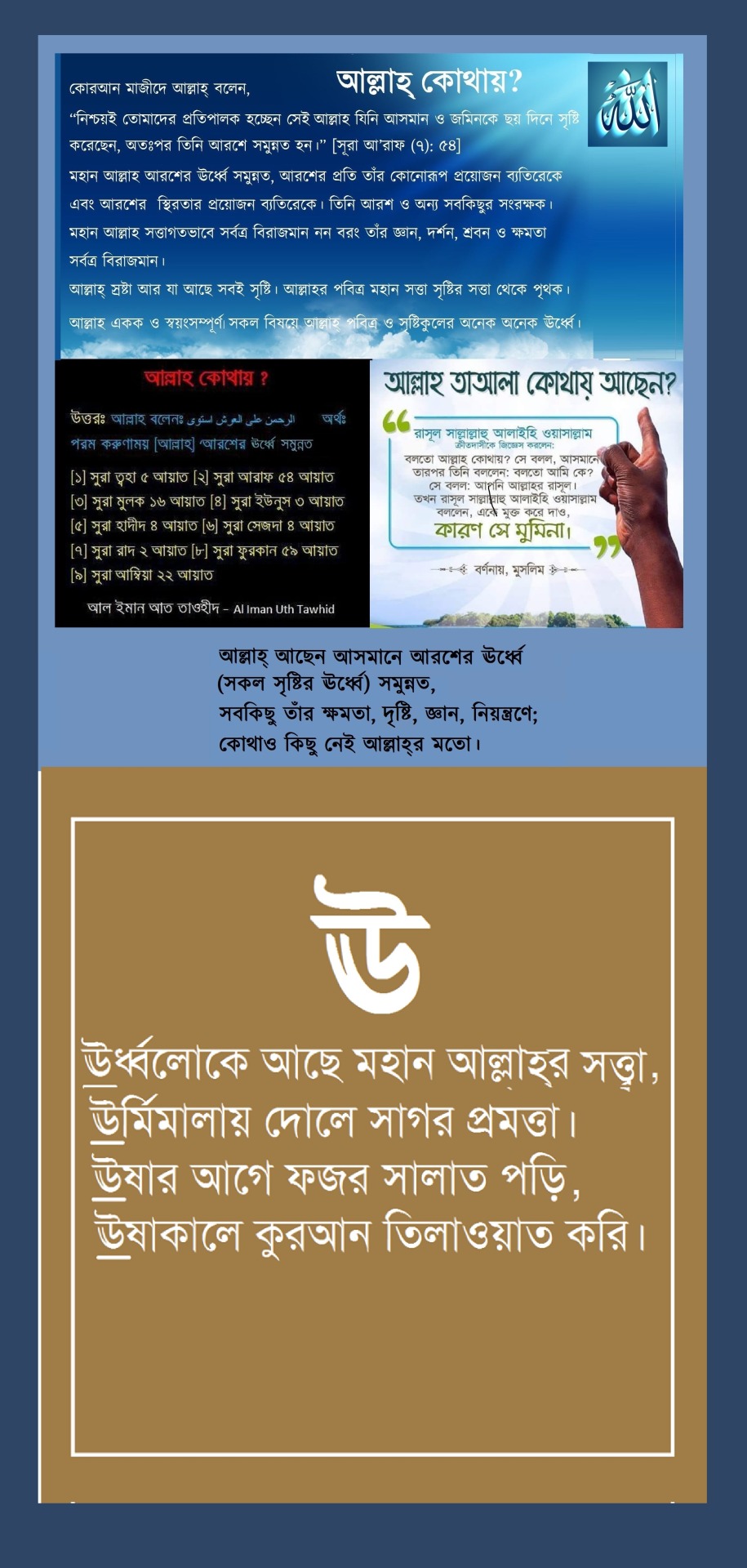
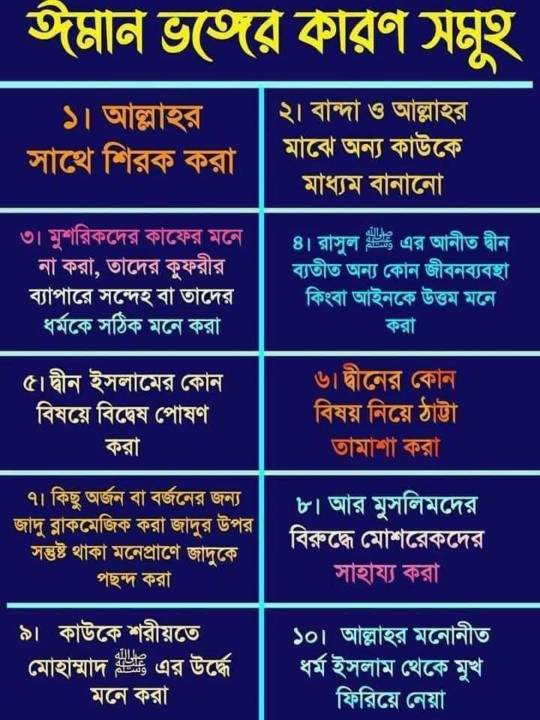
ঋজুতা রাখব আকীদায়-ঈমানে
ঋজুতা রাখব আকীদায় ঈমানে
keep uprightness in faith
Aqidah
আকিদা ( আরবি: العقيدة–আল্-আকিদাহ ; বহুবচন: العقائد–আল-আকা'ইদ ), যা ইসলামি ধর্মতত্ত্ব নামেও পরিচিত, হল একটি ইসলামি পরিভাষা, যার অর্থ 'কিছু মূল ভিত্তির উপর বিশ্বাস স্থাপন'। বিশ্বাস বা ধর্মবিশ্বাস বুঝাতে মুসলিম সমাজে সাধারণত দুইটি শব্দ ব্যবহৃত হয়: ইমান ও আকিদা।
Iman
ঈমান (إِيمَان 'ঈমান', শাব্দিক অর্থ প্রচলিতমতে বিশ্বাস, মতান্তরে স্বীকৃতি) শব্দের আভিধানিক অর্থ স্বীকার করা, স্বীকৃতি দেওয়া, অনুগত হওয়া মতান্তরে দৃঢ় বিশ্বাস করা। এটি কুফর বা অস্বীকার করা বা অবাধ্যতার বিপরীত। ইসলাম ধর্মে ঈমানের অর্থ অত্যন্ত ব্যাপক।।
ইমান শব্দটি আমনুন মূল ধাতু থেকে নির্গত। যার অর্থ -বিশ্বাস করা, আস্থা স্থাপন করা,স্রীকৃতি দেওয়া,নির্ভর করা, মেনে নেওয়া ইত্যাদি। ইসলামি পরিভাষায়, শরিয়তের যাবতীয় বিধি-বিধান অন্তরে বিশ্বাস করা,মুখে স্বীকার এবং অদনুযায়ী আমল করাকে ইমান বলে।ইমানের পরিচয় সম্পর্কে রাসুলুল্লাহ (স.)বলেন- ইমান হচ্ছে আল্লাহ, তাঁর ফেরেশতাকুল কিতাবসমূহ, রাসূলগণ, পরকাল এবং ভাগ্যের ভালো -মন্দের(ভালো -মন্দ আল্লাহ তায়ালার পক্ষ থেকেই হয়) প্রতি বিশ্বাস স্থাপন করা।(মুসলিম)
ঋজুতা রাখব আকীদায় ঈমানে
Keep uprightness in faith
#akidah#pillars of iman#ঋজুতা রাখব আকীদায় ঈমানে#keep uprightness in faith#ঋজুতারাখবআকীদায়ঈমানে#ঋ#ঋজুতা#আকীদা-#ঈমান#আকিদা#ইমান#uprightness#belief#faith#Iman#Aqidah
0 notes
Text

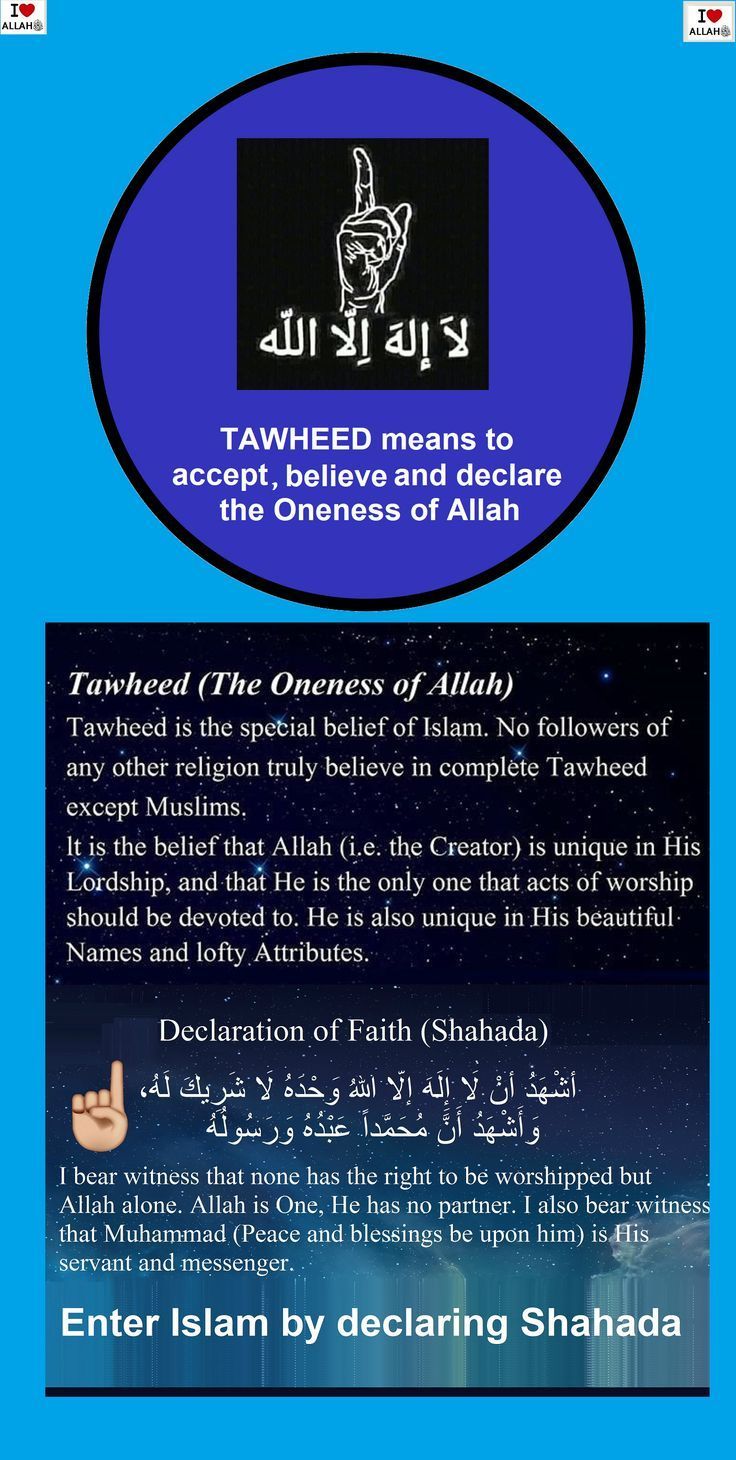


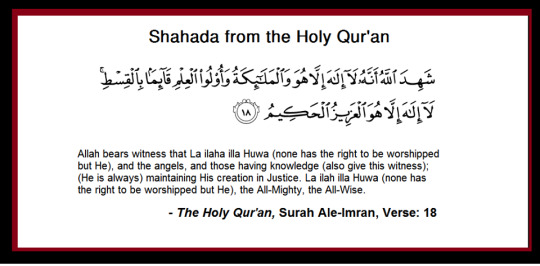







Shahada from holy Qur'an
"Allah Himself bears witness that there is no God but He; and likewise do the angels and the men possessed of knowledge bear witness in truth and justice that there is no God but He, the All-Mighty, the All-Wise.." Al Qur'an,Surah Ale Imran, Ayat 18
youtube
shahada from holy qur'an
Allah ˹Himself˺ is a Witness that there is no god ˹worthy of worship˺ except Him—and so are the angels and people of knowledge. He is the Maintainer of justice. There is no god ˹worthy of worship˺ except Him—the Almighty, All-Wise. (3:18)
Declare Shahadah to enter Islam
"Ashhadu an la ilaha illallah wa ashhadu anna Muhammadan abduhu wa rasuluh" Is. 1) Allah is One and Unique and none is worthy of worship except Allah. 2) Muhammad SA. God's servant and messenger.
Non-Muslims will not get paradise.
Non-Muslims will not get Paradise.
First you need to understand what a Muslim is.
The word Muslim is originally derived from the word Islam. And the word Islam means surrender.
That is, a Muslim is a person who practices Islam or submits to his Lord.
On the other hand, one who does not submit to Allah or obey His commandments is a non-Muslim.
Since a non-Muslim does not live according to Allah's instructions, he cannot enter Paradise(Jannah).
When man believed in God, and did righteous deeds, he perfected himself. He led himself towards profit, success and welfare. But his duty as a believer is not over. He will also call others to a prosperous, successful life. The emergence of Muslims has been for the benefit of world humanity. His duty is to call others to the truth along with himself.
youtube
Non-Muslims will not get paradise.
When man believed in God, and did righteous deeds, he perfected himself. He led himself towards profit, success and welfare. But his duty as a believer is not over. He will also call others to a prosperous, successful life. The emergence of Muslims has been for the benefit of world humanity. His duty is to call others to the truth along with himself.
youtube
Value and importance of time in human life
Allah Rabbul Al-Alamin swears by time in Surah Asr and speaks about faith first. When a person believes in Allah, then does good deeds, then he fulfills himself. Directed himself towards gain, success and prosperity. But his duty as an imandar did not end. Others he will invite to his benevolent, successful life. After correcting himself, the responsibility of the Muslim will be to invite others to the path of truth and goodness and to be patient.
Non-Muslims will not get paradise.
When man believed in God, and did righteous deeds, he perfected himself. He led himself towards profit, success and welfare. But his duty as a believer is not over. He will also call others to a prosperous, successful life. The emergence of Muslims has been for the benefit of world humanity. His duty is to call others to the truth along with himself.
youtube
Value and importance of time in human life
Allah Rabbul Al-Alamin swears by time in Surah Asr and speaks about faith first. When a person believes in Allah, then does good deeds, then he fulfills himself. Directed himself towards gain, success and prosperity. But his duty as an imandar did not end. Others he will invite to his benevolent, successful life. After correcting himself, the responsibility of the Muslim will be to invite others to the path of truth and goodness and to be patient.
#Non-Muslims will not get Paradise.
Declare Shahadah to enter Islam
#Shahada #Faith #Profession #Witness #Testimony #evidence #Iman #belief #Kalema #Islam. "Ashhadu an la ilaha illallah wa ashhadu anna Muhammadan abduhu wa rasuluh" Is. 1) Allah is One and Unique and none is worthy of worship except Allah. 2) Muhammad SA. God's servant and messenger.
youtube
youtube
youtube
youtube
#Non-MuslimswillnotgetParadise (Jannah).#কালেমাশাহাদাত#KalemaShahada#First#Pillar#Islam#IBearWitness#Shahada#Iman#SurahAsr#Jannah#Paradise#Muslim#Quran103#Bytime#Imaan#Faith#Bytime.#NonMuslimswillnotgetParadise#অমুসলিমরা জান্নাত পাবে না।#GoodDeed#Non-Muslims will not get Paradise.#অমুসলিমরাজান্নাতপাবেনা।#Declare Shahadah to enter Islam#Profession#Witness#Testimony#evidence#belief#Kalema
2 notes
·
View notes
Text
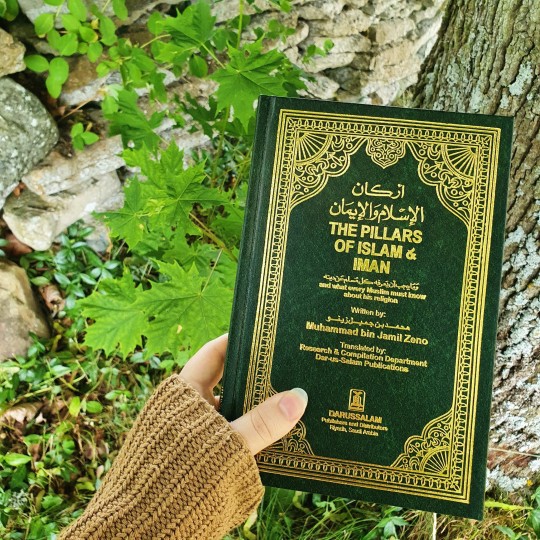

19 Dhū'l-Qa'da 1443 \\ 19 june 2022
🌿 B O O K R E V I E W I S H 🌿
finished reading muhammad ibn jamil zeno's the pillars of islam & iman on some 264 pages in three days??? quickest ive finished a book in a while (sadly not because it got me hooked; i more so wanted to get through it)
what i expected: a book on athari theology
what i got: a translation of a book on hanbali jurisprudence
i don't know why i expected theology when the title of the book puts pillars of islam first. the section on theology is very small and the rest of the book covers hanbali fiqh, if i understood correctly it is mostly excerpts from the book fiqh as-sunna (author not specified). so it is very much an english translation of a modern fiqh book originally written in arabic. i don't even subscribe to the hanbali school of jurisprudence and i prefer to read my fiqh in arabic, so i don't know exactly what i got out of this book. it often quotes ahadith which are good reminders. not being a fan of darussalam as a publishing house i as usual get a bit annoyed at spelling mistakes or typos, of the inconsistency in source referencing, some odd ahadith not being translated and seeming out of place, some odd translations of ahadith not being accompanied by the original arabic text and so on. the jurisprudence covered is also the very basics, yet the book isn't written as if for a very beginner and might thus be confusing for a nonmuslim or new muslim not very familiar with islamic tradition? it also contains quite a bit of repetition which doesn't give it the feeling that it's meant to be read cover to cover but more so to be used as a reference work looked at when needed. i don't really know how to grade it.. maybe 5/10 for being an available book on hanbali fiqh for english speakers? if one is in need of that.
#debussyandbooks#book review#bookblr#books#books & libraries#book photography#muhammad ibn jamil zeno#the pillars of islam & iman
2 notes
·
View notes
Text
The 6 Pillars Of Iman – A Roadmap To Meaning, Purpose, And Connection
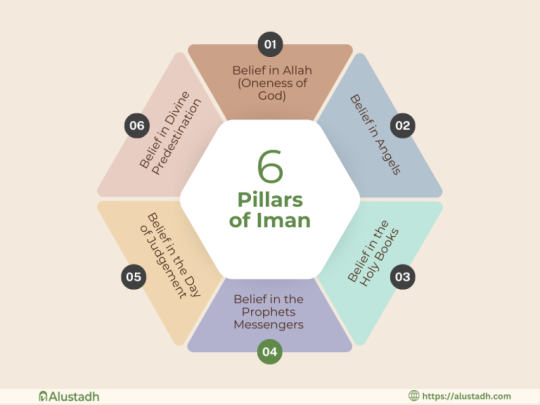
In Islam, the concept of Iman, or faith, is built upon 6 pillars of Iman. These pillars serve as the bedrock of a Muslim's belief system, guiding their understanding of God, the universe, and their place within it. Let's delve into each of these pillars to understand their significance and how they shape the life of a believer.
The 1st Pillar: Belief in Allah (Oneness of God)
The first pillar of Iman is the belief in Allah, the One and Only God. It goes beyond mere acknowledgment; it's about recognizing Allah's sovereignty, submitting to His will, and devoting worship solely to Him. This belief entails Tawheed, which is the recognition of Allah as the sole Creator, Sustainer, and Ruler of the universe. It emphasizes His uniqueness in attributes and the exclusive devotion of all acts of worship to Him. Embracing this pillar provides a foundation for faith, shapes one's worldview, and brings peace and contentment by freeing from associating partners with Allah.
The 2nd Pillar: Belief in Angels
Angels, beings of light created by Allah, serve as messengers and agents in the universe. Acknowledging their existence, understanding their roles, and appreciating their guidance and protection strengthens faith in the unseen aspects of Islam. Belief in angels reminds believers of Allah's constant presence and care, motivating them to seek their assistance and guidance in life.
The 3rd Pillar: Belief in the Holy Books
Throughout history, Allah has revealed His guidance through various scriptures, including the Torah, Psalms, Gospel, and Quran. Belief in the authenticity, preservation, and acceptance of these scriptures provides a roadmap for righteous living, connects believers to the wisdom of previous prophets, and reminds them of Allah's mercy and desire to guide humanity.
The 4th Pillar: Belief in the Prophets and Messengers
Allah has chosen prophets and messengers throughout history to guide humanity towards righteous living and Islam. Acknowledging their divinely chosen role, emulating their conduct, and respecting their diverse missions provide role models for righteous living, highlight the universality of Islam's message, and strengthen faith by understanding the continuity of divine guidance throughout history.
Related: A Practical Guide To How To Learn Quranic Arabic?
The 5th Pillar: Belief in the Day of Judgement
Belief in the Day of Judgement serves as a reminder of ultimate accountability, emphasizing the importance of living a righteous life. It entails belief in resurrection, judgment, rewards, and punishments, promoting accountability, providing hope and motivation, and strengthening faith by reflecting on Allah's justice.
The 6th Pillar: Belief in Divine Predestination
Belief in Divine Predestination explores the relationship between free will and Allah's overarching plan for the universe. It entails acceptance of Allah's control, simultaneous belief in free will, and trust in Allah's wisdom. This belief cultivates patience, promotes gratitude and appreciation, and deepens faith and trust in Allah's ultimate wisdom and justice.
By embracing these six pillars of Iman with conviction, Muslims lay the groundwork for a strong and unwavering faith, guiding their lives and actions according to the principles of Islam.
You can learn more and get benefits with us:
Learn Quran and Arabic
Quran memorisation course
Intermediate Arabic Course
Tajweed Quran course
0 notes
Text
Time and time again, we see an astounding display of faith from the people of Ash-Shaam, whether that be in Syria or Palestine. People all over the world doubt their own faith seeing the state of the ummah, but these people take solace from their iman in situations that would shake anyone else.
It is no wonder that the Messenger of Allah ﷺ has praised Ash-Shaam and its people to such degree:
“If the people of ash-Shaam become corrupt, then there is no goodness in you, but a group of my ummah will remain victorious, not harmed by those who let them down, until the Hour begins.”
[at-Tirmidhi, 2192, hasan saheeh]
Shaykh al-Islam Ibn Taymiyah (رحمه الله) said:
The Prophet ﷺ highlighted the distinct character of the people of ash-Shaam by noting that they will continue to comply with the commands of Allah until the end of time, and that the victorious group will remain among them until the end of time. This is speaking of an ongoing matter that will remain with them, that they will be numerous and strong.
This description does not apply to anyone in the Muslim world except the people of ash-Shaam… knowledge and faith are still present in that land, and whoever fights in that land to support the faith will be victorious and will be granted divine help.
[Majmoo‘ al-Fataawa (4/449)]
It was narrated that Abu’d-Dardaa’ said: The Messenger of Allah ﷺ said:
“Whilst I was sleeping, I saw the pillar of the Book being taken from beneath my head, and I thought that it was being taken away, so I followed it with my gaze, and it was taken to ash-Shaam. Verily faith, when tribulations come, will be in ash-Shaam.”
[Musnad Imam Ahmad (36/62); classed as saheeh by the commentators on al-Musnad]
Shaykh al-Islam Ibn Taymiyah (رحمه الله) said:
The pillar of the book and Islam – this refers to something that acts as a support; what is referred to here is those who learn the Qur’an and adhere to it]
This is similar to the words of the Prophet ﷺ: “The heartland of the believers is ash-Shaam.”
[Majmoo‘ al-Fataawa (27/42)]
May Allah have mercy on the blessed land and the blessed people of Ash-Shaam, and may He aid them against His enemies. Ameen.
68 notes
·
View notes
Note
omg imane hi!!! i saw ur tags about boycotting umra and hajj and i couldnt agree MORE ! this is the first time ive seen someone else say this ducjxj thank u for the validation <3 my country has fully commercialised the whole hajj/umra process that it literally costs tens of thousands to go! the idea of spending an arm and a leg AND knowing that the money is getting channeled to the shaytan in disguise tht is saudi doesnt sit right with me!! i kno its part of the pillars in islam and all but like. i would like to think that these r good enough reasons to boycott
omg some people really do try to make you look crazy for saying you don’t want to go on a PILGRIMAGE aka the most important act of religious spirituality for ethical reasons like hello?????? 1+1 = 2 and I don’t want to give my money to one of the most corrupt regimes in the world who incidentally turned one of the fundamental tenets of Islam into a touristic circus ugh just thinking about it disgusts me. every year my aunt is like when are you sending your mom to do her omra and I’m like did you think my stance changed in the last year of even more fucked up shenanigans from MBS and his regime? like I can’t believe so few people think it’s insane to pay 10k (which is I think the average price!) to go to the most important religious locus in Islam it should be a commons accessible to all Muslims tf not just the ones who 1. Can afford it and 2. Don’t give a fuck about where their money is going. Ugh. those are definitely good enough reasons to boycott imo and I’m sure there are sheikhs who have made the case but they’re so marginalised that we just have to live with our principles and hope people get with the programme some day inshAllah lol. and thank u for ur message! Just today I saw this tweet it’ll comfort you to see that more people are adopting this position:

13 notes
·
View notes
Text
ISLAM 101: AN INTRODUCTION TO HADITH: Part 8
Iman; Islam; Ihsan
Umar ibn al-Khattab reports:
“We were sitting with Allah’s Messenger, upon him be peace and blessings, when there appeared a man before us a man whose clothes were exceedingly white, whose hair was exceedingly black, upon whom traces of traveling could not be seen, and whom none of us knew. He sat down close to the Prophet, may Allah bless him and grant him peace, so that he rested his knees upon his knees and placed his two hands upon his thighs and said: ‘Muhammad! Tell me about Islam.’ Allah’s Messenger, upon him, be peace and blessings, said: ‘Islam is that you witness that there is no deity but Allah and that Muhammad is His Messenger, and you establish the Prayer, and you give the zakah (prescribed annual alms), and you fast (during the month of) Ramadan, and you perform the hajj (pilgrimage) to the House if you are able to find a way to it.’ He said, ‘You have told the truth,’ and we were amazed at him asking him and [then] telling him that he told the truth. He said, ‘Tell me about belief (iman).’ He (the Messenger of Allah) said: ‘That you affirm Allah, His angels, His Books, His Messengers, and the Last Day, and that you affirm the Decree, the good of it and the bad of it.’ He said, ‘You have told the truth.’ He said, ‘Tell me about ihsan (perfect goodness).’ He said: ‘That you worship Allah as if you see Him, for although you cannot see Him, truly He sees you.’ He said, ‘Tell me about the Hour.’ He said: ‘The one asked about it knows no more than the one asking.’ He said, ‘Then tell me about its signs.’ He said, ‘That the female slave should give birth to her mistress, and you see poor, naked, barefoot shepherds of sheep and goats competing in raising tall buildings.’ He went away, and I remained some time. Then he (Allah’s Messenger) asked: Umar, do you know who the questioner was?’ I said, ‘Allah and His Messenger know best.’ He said: ‘He was Jabrail. He came to you to teach you your religion.’” (Sahih Muslim, Iman, 1).
Note: Refer to Unit Five for further information on Umar ibn al-Khattab, the narrator of this hadith.
EXPLANATION OF THE HADITH
Archangel Jabrail’s appearing before the Messenger of Allah and asking questions was for the purpose of teaching the Companions their religion.
This hadith came to pass near the time of the Prophet’s demise, as the Pilgrimage became obligatory after the conquest of Mecca and the Pilgrimage has been listed among the pillars of Islam mentioned herein.
The questions directed to the Prophet in the hadiths have been asked rather methodologically. Due to its externals, Islam has been inquired about first, followed by belief—which pertains to the inner world or heart entirely—and later perfect goodness, or ihsan, the highest degree of belief.
To the question concerning the Last Day, the Messenger of Allah replied that he did not know. However, it was Archangel Jabrail who had previously communicated to the Prophet, via Divine revelation, that he ought to reply in such a way to this question, and he knew that Allah’s Messenger would reply in this way. In that case, why did he ask?
His reasons for asking this question are the following:
To demonstrate to all others that this matter was among the Divine secrets and that even the Prophet himself could not acquire knowledge in this regard, without the permission of Allah.
Through this response, the Messenger of Allah illustrated before all those Companions, despite being a Prophet, just how connected he was to truth; at the same time, he demonstrated that a person cannot know everything and that it was not shameful or damaging to one’s pride to admit that one does not know something.
IMAN AND ISLAM
Iman: Verbal profession and confirmation with the heart. This signifies the heart’s affirming what the tongue utters. Accordingly, if the heart fails to affirm what the tongue declares, a person cannot be considered to have believed in the complete sense, even if they perform their worship outwardly. In any case, such people are referred to as hypocrites (munafiqun) in Islam.
In this hadith, the Messenger of Allah has referred to the aspects of religion pertaining to the heart as iman and those concerning practice, or deeds, as Islam.
Imam Zuhri states: “Islam is a word, while iman is the deed.” In other words, Islam must be understood in the literal sense. Belief, however, is praxis and implementation.
IHSAN
The literal meaning of ihsan is twofold: The word denotes doing something well and to perfection; it also comes to mean doing what is beautiful and good to others. The aspect of perfect goodness in this sense, which looks to human beings, is represented in the principle, “Wish for others what you wish for yourself.”
The universal dimension which encompasses all creatures is explained in the hadith,
“Verily Allah has prescribed ihsan (excellence, perfection) in all things. So if you kill then kill well and if you slaughter, then slaughter well. Let each one of you sharpen his blade and let him spare suffering to the animal he slaughters.”
The Qur’anic verse,
“Is the recompense of excellence (in obedience to Allah) other than excellence?” (ar-Rahman 55:60)
evokes this meaning. On one occasion, the Prophet had recited this verse and asked his Companions:
“Do you know what your Lord wills to reveal through this verse?” Upon their replying, “Allah and His Messenger know best,” he said that Allah said, “Can the reward for one whom I favored (in their worldly life) with belief in Divine Unity, be other than Paradise?”
Allah has decreed the following in relation to perfect goodness:
Allah enjoins justice (and right judgment in all matters), and devotion to doing good, and generosity towards relatives, and He forbids you indecency, wickedness and vile conduct (all offenses against religion, life, personal property, chastity, and health of mind and body). He exhorts you (repeatedly) so that you may reflect and be mindful! (an-Nahl 16:90)
SIGNS OF THE LAST DAY
That the female slave should give birth to her mistress: Implied here is that there will come such a time, towards the Last Day, in which children will be undutiful, disrespectful and unloving towards their parents. They will not show them the required love and benevolence and will not observe the rights of parents. They will perpetrate unimaginable evil towards their parents, to whom Allah prohibited even the saying of “Ugh!” (as an indication of complaint or impatience). Another noteworthy point in the text of the hadith is the Messenger’s use of the feminine rabbata (mistress). This illustrates that the child being born is female. So confused will everything become that even daughters, who normally have a closer relationship of reciprocal love and compassion with their mothers, will mistreat their mothers. Allah and His Messenger know best.
…and you see poor, naked, barefoot shepherds of sheep and goats competing in raising tall buildings: There will come such a time when people who are unqualified and incompetent will reach high positions with their money. They will become police officers, ministers, doctors, and the like. They will, as such, violate the rights of others and misdirect and mismanage government, and corruption, theft, and deception will increase.
LESSONS FROM THE HADITH
Angels can appear in human form. They can speak, and human beings can hear their speech.
Iman constitutes accepting the essentials of belief, while Islam is putting the rules prescribed by the religion into practice in one’s life.
A person’s openly declaring the Declaration of Faith is necessary for way of their being accepted as Muslim.
The question-and-answer method is an effective technique in education and teaching.
Respect to scholars and assemblies of learning is elemental.
Knowledge of the Last day rests only with Allah.
Affairs being placed in the hands of those unqualified to undertake them, the increase of disobedience, and the disintegration of the family institution are signs of the Last Day.
A Muslim must always act in the consciousness of responsibility.
Perfect goodness and self-supervision (muraqaba) are of two degrees: The servant’s living their life “as if seeing Allah,” is the first degree. “Knowing that He sees them though they do not see Him” constitutes the second degree.
#Allah#god#islam#quran#muslim#revert#revert islam#convert#convert islam#converthelp#reverthelp#revert help#revert help team#help#islam help#salah#dua#prayer#pray#reminder#religion#mohammad#muslimah#hijab#new muslim#new revert#new convert#how to convert to islam#convert to islam#welcome to islam
3 notes
·
View notes
Text

There was a YouTube video of a scholar who was conducting a halaqah in al-Masjid an-Nabawi, but was suddenly repeatedly interrupted by another person. The man tried to talk over the sheikh while he was teaching, but the sheikh didn’t get agitated or angry. Didn’t say “Do you know who I am?” Rather the sheikh smiled, and basically replied that his question would be answered in due time.
That’s husnul-khuluq — an oft-forgotten act of worship that is beloved to Allah. Sheikh Ibn Taymiyyah wrote in his Kitab al-Iman that Imam al-Hassan al-Basri (may Allah have Rahmah on both of them) said husnul-khuluq has 3 main pillars:
(1) Badhlul-nada (Generosity) — and generosity isn’t limited to just giving wealth.
🌟 Rasulullah ﷺ said: ❛The son of Adam has three hundred and sixty joints, and charity is due upon each one of them every day. A kind word that a man speaks is charity. A man helping his brother with something is charity. Giving someone a drink of water is charity. Removing harmful things from the road is charity.❜ 【Al-Mu’jam al-Kabir 11/55 | Graded Sahih by Sh. al-Albani rahimahullah】
(2) Kafful-adha (Refraining from harming others).
🌟 Rasulullah ﷺ was asked: ❛Which of the Muslims is the most virtuous?❜ He ﷺ said: ❛The one whom the Muslims are safe from his tongue and his hand.❜ 【At-Tirmidhi 2504 | Graded Sahih】
(3) Talaqatul-wajh (Cheerfulness).
🌟 Jarir ibn Abdullah said: ❛I would never see him (i.e. Rasulullah ﷺ) but with a smile on his face.❜ 【Sahih Muslim 2475】
May Allah grant us husnul-khuluq, protect us from bad character, and make us among those who will be the nearest to Rasulullah ﷺ on the Day of Judgement.
Your sister in Deen,
Aida Msr ©
This is a modified snippet from an article I wrote exclusively for QalbyApp. You can read the full article here, in shaa Allah: Husnul-Khuluq, the Oft-Forgotten ‘Ibaadah
7 notes
·
View notes
Text
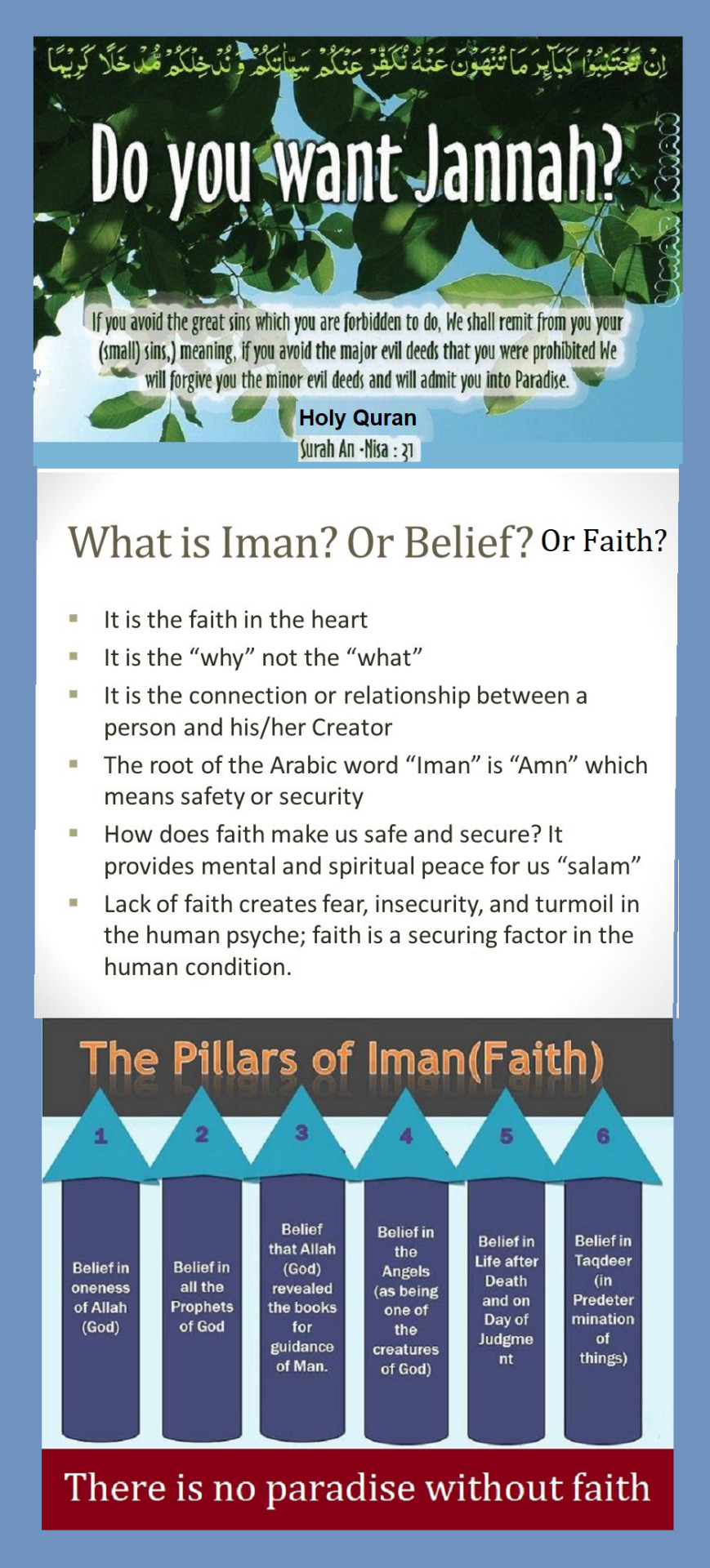
If you want to go to Paradise, you need faith and good deeds
Iman (Arabic: إِيمَان, romanized: ʾīmān, lit. 'faith' or 'belief', also 'recognition') in Islamic theology denotes a believer's recognition in faith and deeds in the religious aspects of Islam. Its most simple definition is the belief in the six articles of faith, known as arkān al-īmān.
The role of Iman is very important for the growth of human values. Iman fosters the growth of human values in a number of ways. About the basic implication of Iman the Almighty says: “There is no entity but Allah worthy of worship. ... A person believing in this creed bows down only before Allah, the Most Supreme.
youtube
youtube
youtube
youtube
youtube
#Imaan#Youtube#IslamicFaith#IslamicBeliefs#6pillars#Akidah#islamic beliefs#IslamicCreed#Faith#Belief#Eman#Emaan#pillars of iman#Iman
0 notes
Text
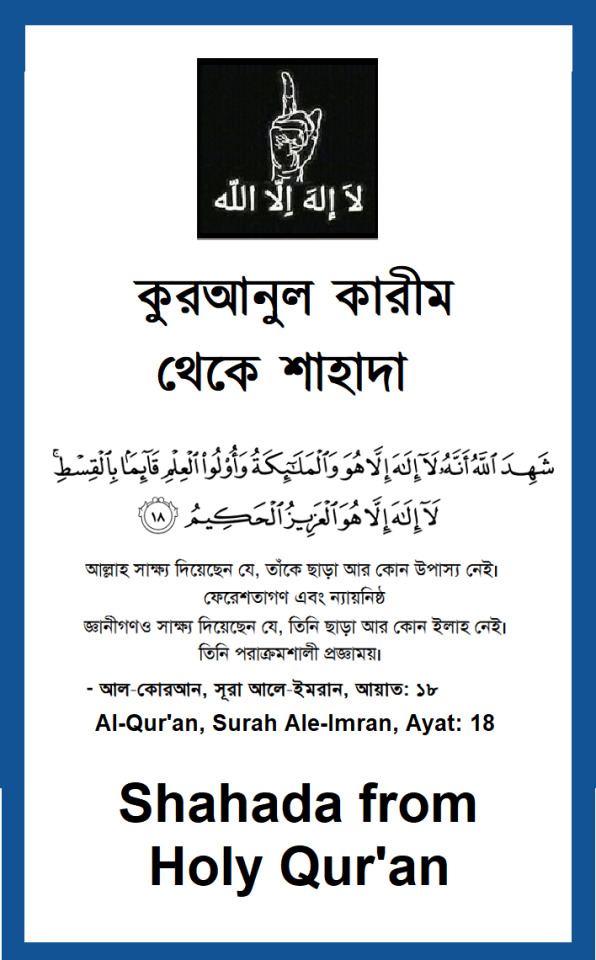
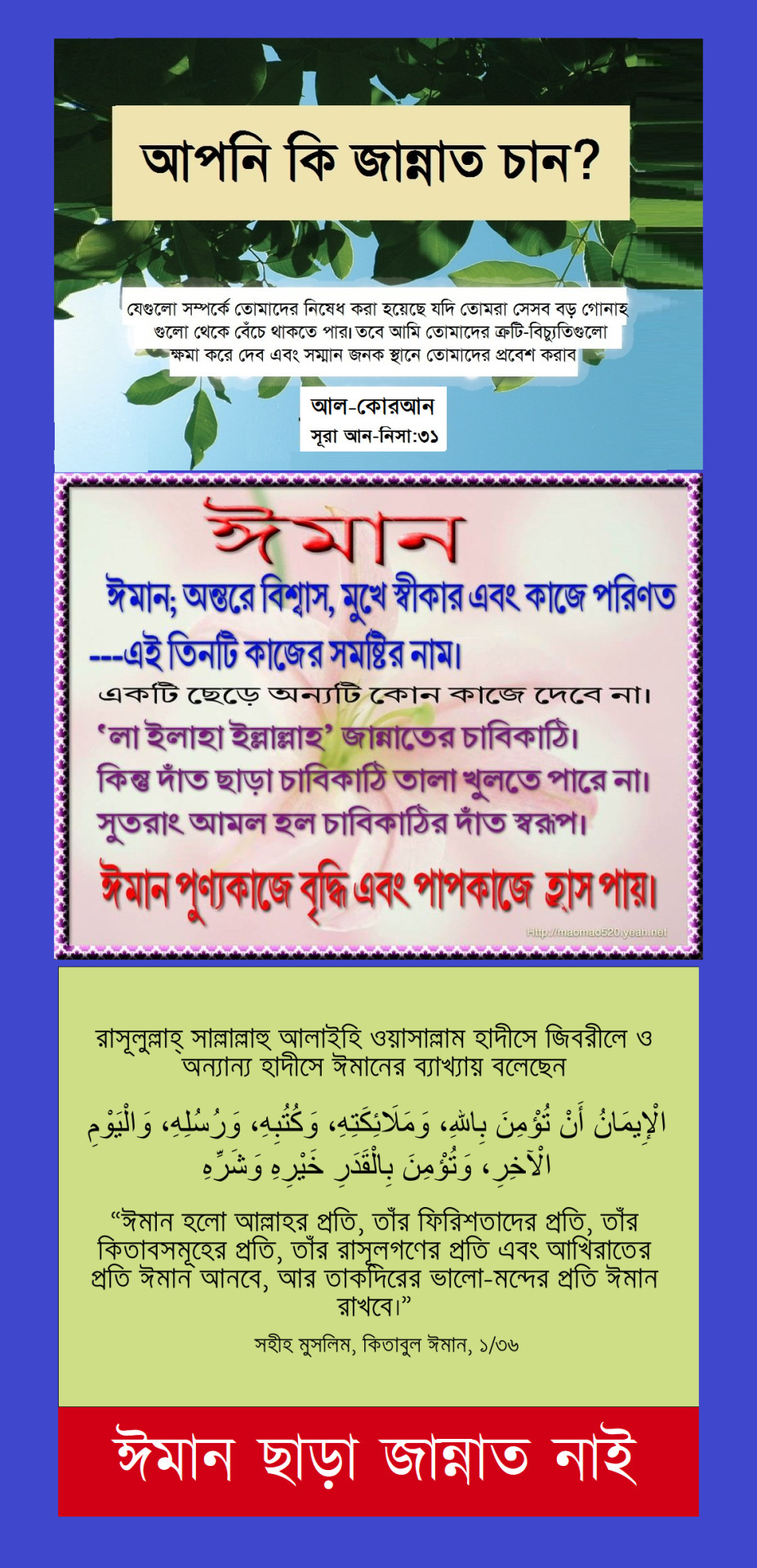
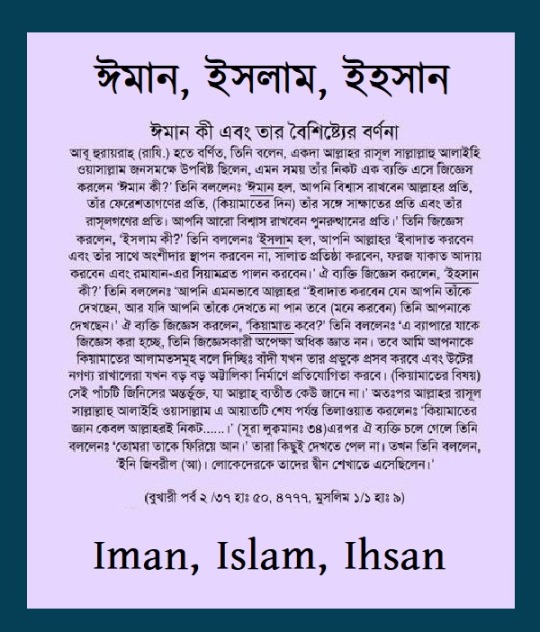
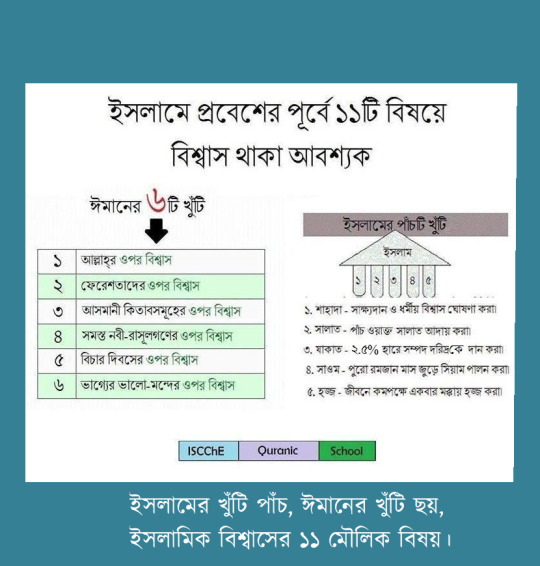
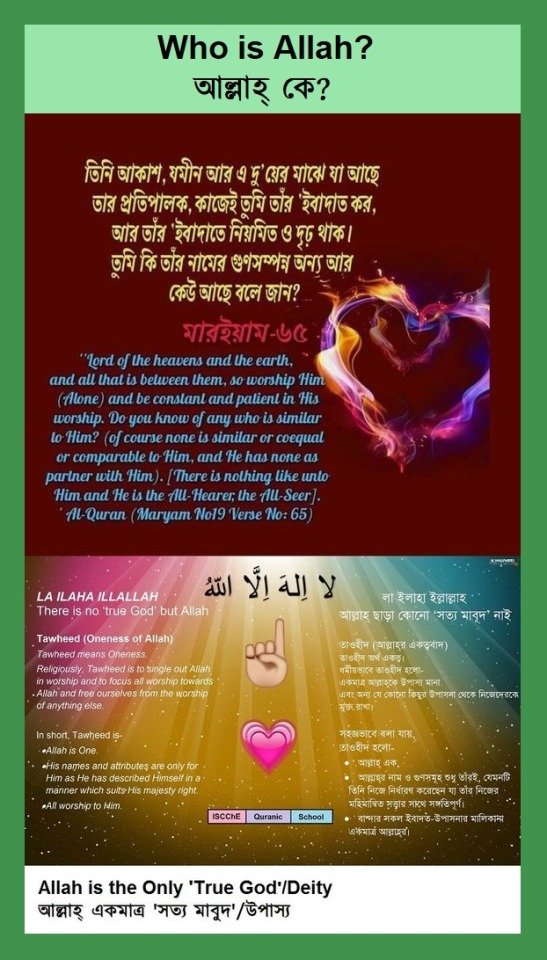
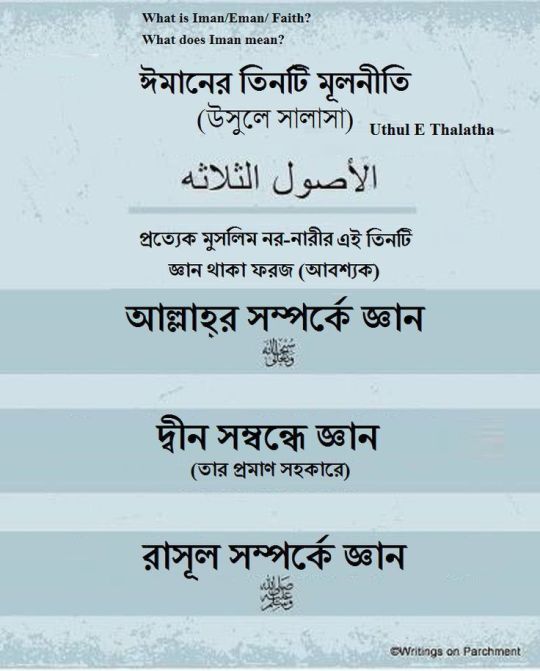

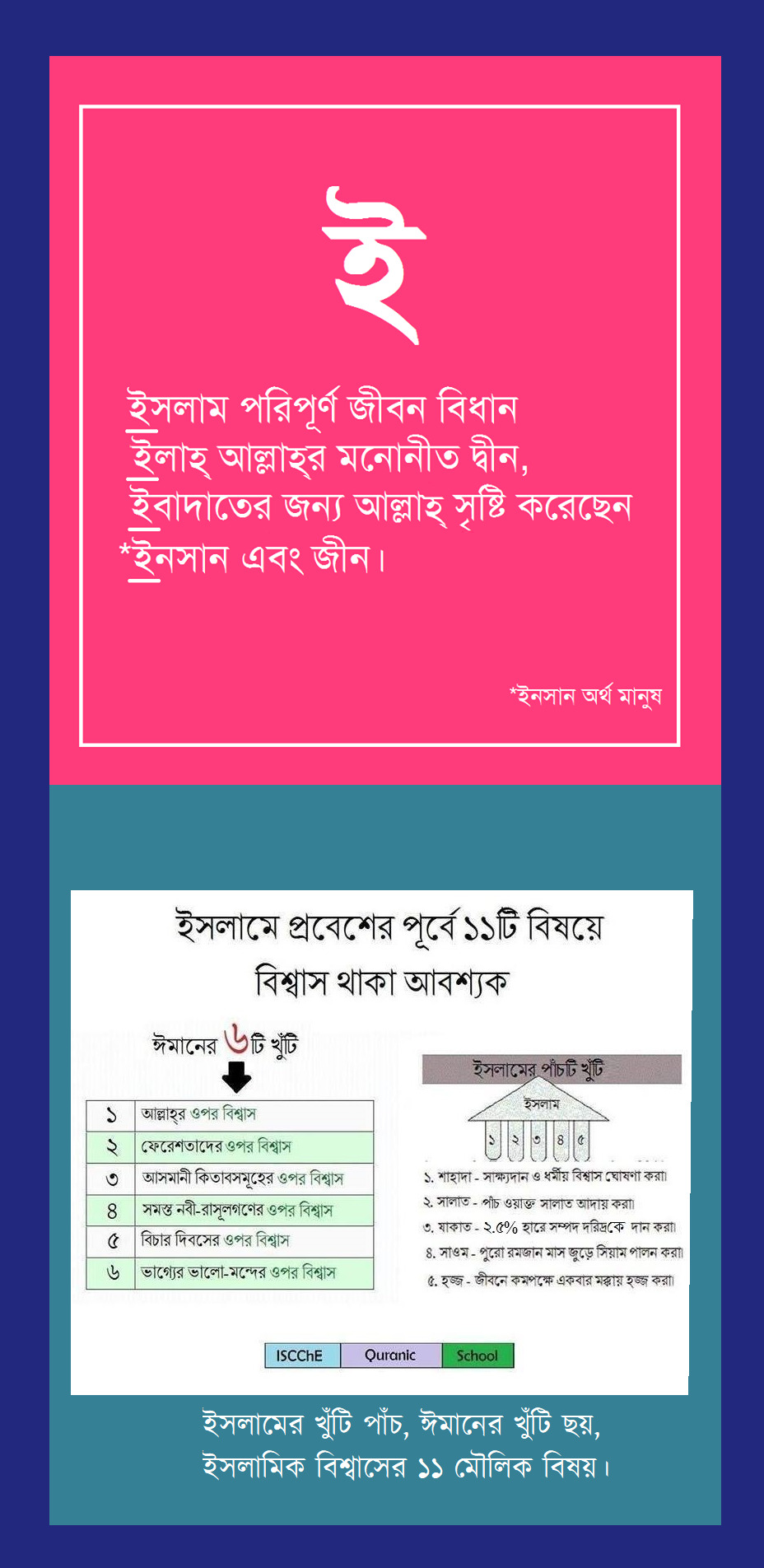

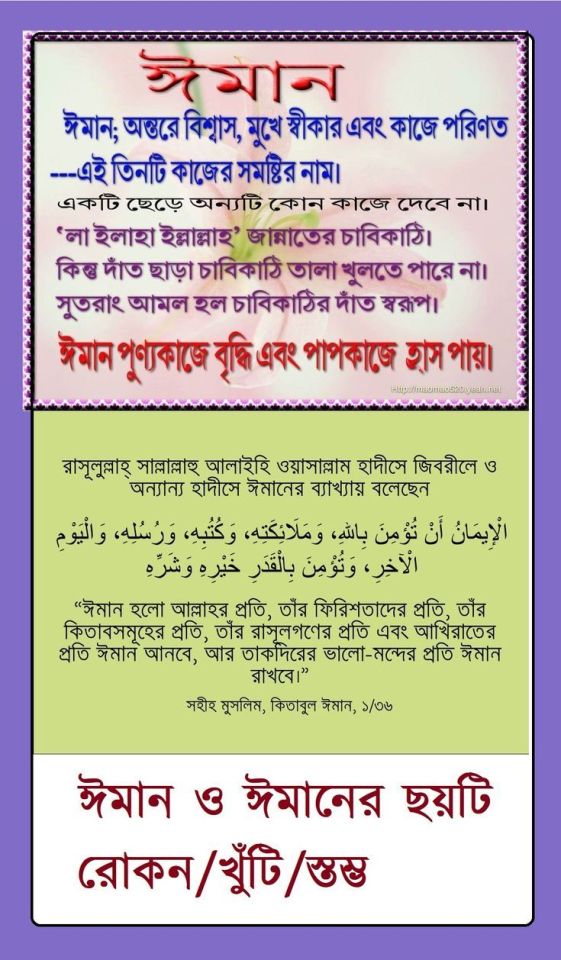
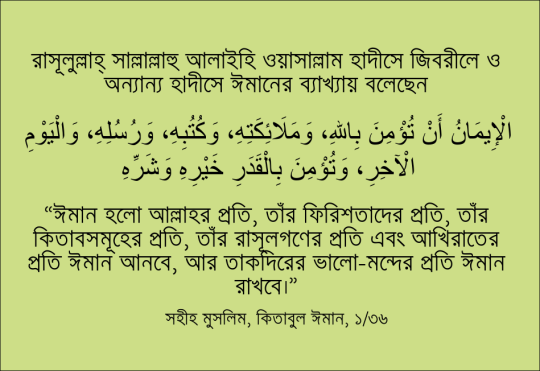


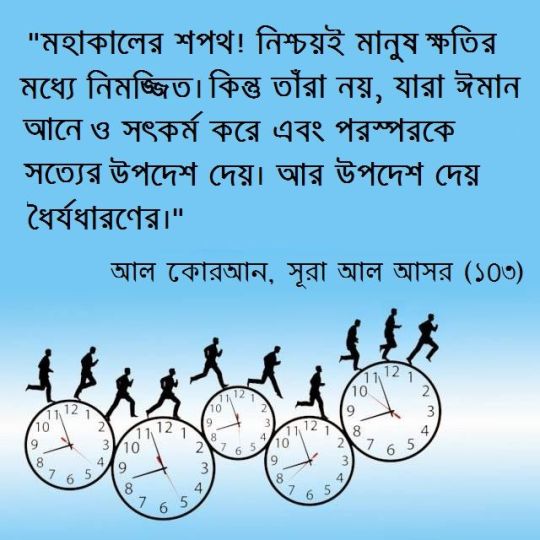
ঈমান
ঈমান (إِيمَان 'ঈমান', শাব্দিক অর্থ প্রচলিতমতে বিশ্বাস, মতান্তরে স্বীকৃতি) শব্দের আভিধানিক অর্থ স্বীকার করা, স্বীকৃতি দেওয়া, অনুগত হওয়া মতান্তরে দৃঢ় বিশ্বাস করা। এটি কুফর বা অস্বীকার করা বা অবাধ্যতার বিপরীত। ইসলাম ধর্মে ঈমানের অর্থ অত্যন্ত ব্যাপক।
ঈমান কাকে বলে? উত্তরঃ ঈমানের সাধারণ অর্থ বিশ্বাস। আর পারিভাষিক অর্থ তিন প্রকার বিষয়ের সমন্বয়ে গঠিত-
১। আততাসদিক বিলকাল্ব- অন্তরে বিশ্বাস করা বা অন্তর দ্বারা সত্যায়ন করা।
২। ওয়াল ইকরার বিললিসান- মৌখিক ভাবে স্বিকৃতি দেয়া।
৩। ওয়াল আমল বিল যাওয়ারেহ- আল্লাহর সকল বিধিবিধান যা তিনি তাঁর রাসূল মুহাম্মাদ (সাঃ) এর প্রতি ওহী করেছেন তা কমবেশ না করে মান্য করা বা আমল করা, ইত্যাদি।
ঈমানের মৌলিক ৬ স্তম্ভ
The basic 6 pillars of faith
ঈমান ঠিক না করে জীবনভর নেক আমল করলেও আখেরাতে কোনো লাভ হবে না। জিবরাঈল (আ.) আল্লাহর পক্ষ থেকে ছদ্মবেশে এসে রাসুলুল্লাহ (সা.) কে জিজ্ঞাসা করলেন, ঈমান কাকে বলে? জবাবে রাসুলুল্লাহ (সা.) বললেন, ‘ঈমানের হাকিকত বা স্বরূপ হলো, তুমি বদ্ধমূলভাবে বিশ্বাস স্থাপন করবে আল্লাহ তায়ালার প্রতি, তাঁর ফেরেশতাদের প্রতি, আসমানি কিতাবগুলোর প্রতি, আল্লাহর নবী-রাসুলদের প্রতি, কেয়ামত দিবসের প্রতি এবং তকদিরের ভালো-মন্দ সবকিছুই আল্লাহর পক্ষ থেকে নির্ধারিত হওয়ার প্রতি।’ (বোখারি : ৫০)। উল্লিখিত হাদিসটি ‘ঈমানে মুফাসসাল’ এর ভিত্তি। ঈমানে মুফাসসালে ঘোষণা করা হয়, আমি ঈমান আনলাম, ১. আল্লাহ তায়ালার প্রতি, ২. তাঁর ফেরেশতাদের প্রতি, ৩. তাঁর কিতাবগুলোর প্রতি, ৪. তাঁর নবী-রাসুলদের প্রতি, ৫. কেয়ামত দিবসের প্রতি, ৬. ভালো-মন্দ তকদিরের প্রতি
ঈমানের ৩টি মূলনীতি ও ৬টি রুকন।
কবরে তিন প্রশ্ন-পরকালের প্রথম ধাপ হলো কবর। কবরে বান্দাকে তিনটি বিশেষ প্রশ্ন করা হবে। বারা বিন আজেব (রা.) থেকে বর্ণিত, রাসুলুল্লাহ (সা.) বলেন, কবরে মানুষকে তিনটি প্রশ্ন করা হবে। এক. তোমার রব কে? দুই. তোমার দ্বিন কী? তিন. এই লোকটি কে ছিলেন, যাকে তোমাদের কাছে প্রেরণ করা হয়েছিল? কবরবাসী যদি মুমিন হয়, তাহলে এসব প্রশ্নের যথাযথ জবাব দিতে পারবে। আর যদি কাফির হয়, তাহলে বলবে, আফসোস! আমি কিছুই জানি না।’ (আবু দাউদ, হাদিস : ৪৪৫৩; তিরমিজি, হাদিস : ৩১২০)
ঈমানের উসূল কয়টি ও কি কি?
ঈমানের উসূল ৩ টি। ১। আল্লাহর মা’আরিফাত বা আল্লাহ সম্পর্কে জানা।
২। দ্বীন ইসলামের মা’আরিফাত বা দ্বীন ইসলাম সম্পর্কে জানা।
৩। আল্লাহর নবী মুহাম্মাদ (সাঃ) এর মা’আরিফাত বা নবী মুহাম্মাদ (সাঃ) সম্পর্কে জানা।
ঈমান সমগ্র দ্বীনকে অন্তর্ভুক্ত করে। ঈমান শুধু বিশ্বাসের নাম নয় ; বরং মৌখিক স্বীকৃতি ও কর্মে বাস্তবায়নের মাধ্যমে তার বাস্তব প্রতিফলনকে অপরিহার্য করে দেয়। সুতরাং ঈমানের দুটি অংশ। একটি হলো অন্তরে স্বচ্ছ আকিদা পোষণ। আরেকটি হলো বাহ্যিক তৎপরতায় তার প্রকাশ। এ দুটি পরস্পরের সঙ্গে এমনভাবে সংযুক্ত যে কোনো একটির অনুপস্থিতি ঈমানকে বিনষ্ট করে দেয়।
ইমান আরবি শব্দ। আরবি ‘আমনুন’ শব্দ থেকে এর উৎপত্তি। শব্দটির মূল অর্থ বিশ্বাস করা, স্বীকৃতি দেওয়া এবং বিশ্বস্ততা বা হৃদয়ের স্থিতি। এ ছাড়া আনুগত্য করা, শান্তি, নিরাপত্তা, অবনত হওয়া এবং আস্থা অর্থেও ইমান শব্দটি ব্যবহৃত হয়। (মুয়জামুল মাকায়িসিল লুগাহ, ১/১৩৩)
বিশ্বাস বা ধর্মবিশ্বাস বোঝাতে পবিত্র কোরআনে ও হাদিসে ইমান শব্দটি বিভিন্নভাবে ব্যবহৃত হয়েছে। আর বিশ্বাসী বোঝাতে ব্যবহৃত হয়েছে মুমিন শব্দটি।
আল্লাহতায়ালা পবিত্র কোরআনে এরশাদ করেন, ‘আর কেউ ইমান প্রত্যাখ্যান করলে তার কর্ম বিনষ্ট বা নিষ্ফল হবে এবং সে পরকালে ক্ষতিগ্রস্ত ব্যক্তিদের অন্তর্ভুক্ত হবে’ (সুরা মায়িদা, আয়াত: ৫)। আরও এরশাদ হয়��ছে, ‘তিনিই তোমাদের সৃষ্টি করেছেন। আর তোমাদের মধ্যে রয়েছে কতক কাফির এবং কতক মুমিন। (সুরা তাগাবুন,
ইমান কী? ইমানের মূল পরিচয় একটি হাদিসে সহজভাবে বিবৃত হয়েছে। আবু হুরায়রা (রা.) বর্ণনা করেছেন যে একবার হজরত জিবরাইল (সা.) মানুষের বেশে রাসুলুল্লাহ (সা.)-এর সামনে এসে জিজ্ঞাসা করলেন, ‘ইমান কী? তিনি উত্তরে বলেন, আল্লাহর প্রতি, তাঁর ফেরেশতাগণের প্রতি, তাঁর পুস্তকগুলো (আসমানি কিতাব), তাঁর সাক্ষাতে, তাঁর রাসুলদের প্রতি বিশ্বাস স্থাপন করা এবং শেষ দিবসে পুনরুত্থান ও তাকদিরের প্রতি বিশ্বাস স্থাপন (করার নাম ইমান)। (বুখারি, হাদিস: ৫০)
বিভিন্ন ইমামের কাছ থেকে পরিভাষাগতভাবে ইমানের বিভিন্ন আঙ্গিকের সংজ্ঞা পাওয়া যায়। তবে সেসব সংজ্ঞার মূল বক্তব্য কাছাকাছি। ইমাম আবু হানিফা (র.) বলেছেন, ‘ইমান হচ্ছে অন্তরের সত্যায়ন ও মুখের স্বীকৃতি।’ ইমাম শাফেয়ি, মালেক ও আহমদ ইবনে হাম্বল (র.)-র মতে, ‘অন্তরের বিশ্বাস, মৌখিক স্বীকৃতি এবং আমলে বাস্তবায়ন করার নাম ইমান।’
ইমান কী? ইমানের মূল পরিচয় একটি হাদিসে সহজভাবে বিবৃত হয়েছে। আবু হুরায়রা (রা.) বর্ণনা করেছেন যে একবার জিবরাইল (সা.) মানুষের বেশে রাসুলুল্লাহ (সা.)-এর সামনে এসে জিজ্ঞাসা করলেন, ‘ইমান কী? তিনি উত্তরে বলেন, আল্লাহর প্রতি, তাঁর ফেরেশতাগণের প্রতি, তাঁর পুস্তকগুলো (আসমানি কিতাব), তাঁর সাক্ষাতে, তাঁর রাসুলদের প্রতি বিশ্বাস স্থাপন করা এবং শেষ দিবসে পুনরুত্থান ও তাকদিরের প্রতি বিশ্বাস স্থাপন (করার নাম ইমান)। (বুখারি, হাদিস: ৫০)
পবিত্র কোরআনের একাধিক আয়াত (সুরা বাকারা, আয়াত: ১৩৬, ১৭৭ ও ১৮৫; সুরা কামার, আয়াত: ৪৯; সুরা নিসা: ১৩৬) এবং হাদিসের (বুখারি, হাদিস: ১/৯৬-৯৭; মুসলিম, হাদিস আল্লাহর প্রতি বিশ্বাস, ফেরেশতাগণের প্রতি বিশ্বাস, আসমানি কিতাবসমূহের প্রতি বিশ্বাস, নবি-রাসুলগণের প্রতি বিশ্বাস, আখিরাতের প্রতি বিশ্বাস, তাকদিরের প্রতি বিশ্বাস।: ১/১৫৭) ভিত্তিতে ইমানের আরকান বা স্তম্ভ মোট ছয়টি
বিভিন্ন ইমামের কাছ থেকে পরিভাষাগতভাবে ইমানের বিভিন্ন আঙ্গিকের সংজ্ঞা পাওয়া যায়। তবে সেসব সংজ্ঞার মূল বক্তব্য কাছাকাছি। ইমাম আবু হানিফা (র.) বলেছেন, ‘ইমান হচ্ছে অন্তরের সত্যায়ন ও মুখের স্বীকৃতি।’ ইমাম শাফেয়ি, মালেক ও আহমদ ইবনে হাম্বল (র.)-র মতে, ‘অন্তরের বিশ্বাস, মৌখিক স্বীকৃতি এবং আমলে বাস্তবায়ন করার নাম ইমান।’ ছয়টি মৌলিক বিশ্বাসের সমষ্টির নাম ইমান। বিষয় ছয়টি হলো: ১. আল্লাহর প্রতি, ২. ফেরেশতাদের প্রতি, ৩. নবী-রাসুলদের প্রতি, ৪. আল্লাহ প্রেরিত কিতাবগুলোর প্রতি, ৫. পরকাল, পুনরুত্থান বা শেষ দিবসের প্রতি এবং ৬. তাকদিরের (ভাগ্য) প্রতি ইমান (বিশ্বাস স্থাপন করা) আনা।
এই ৬ টি বিষয়ের সব কটির ওপর যদি কেউ সমভাবে ইমান না আনে, তবে তাঁর ইমান পূর্ণাঙ্গ হবে না।
নবী-রাসুলদেরটি ছাড়া ইমানের অন্য সব কয়টি রোকন অদৃশ্য। আর নবী-রাসুলগণকেও এই যুগে এখন আর চোখে দেখার কোনো সুযোগ নেই। সুতরাং ইমানের সার্বিক বিষয়াবলি গায়েব বা অদৃশ্য। পবিত্র কোরআনে মুত্তাকিদের বৈশিষ্ট্য বর্ণনা করতে গিয়ে এরশাদ হয়েছে, ‘যারা অদৃশ্য বা গায়েবের প্রতি বিশ্বাস স্থাপন করে।’ (সুরা বাকারা, আয়াত: ৩) পবিত্র কোরআন ও হাদিসের আলোকে ইমান বা বিশ্বাসের ক্ষেত্রে দুটি বিষয়ে সাক্ষ্য দিতে নির্দেশ করা হয়েছে, যাকে আমরা কালিমায়ে শাহাদত নামে চিনি বা জানি।
এ কালিমার প্রথম বিষয় হচ্ছে, ‘আমি সাক্ষ্য দিচ্ছি আল্লাহ ছাড়া কোনো
'সত্য উপাস্য' বা মাবুদ নেই।’ দ্বিতীয় বিষয়টি হচ্ছে, ‘আমি আরও সাক্ষ্য দিচ্ছি, মুহাম্মাদ (সা.) আল্লাহর বান্দা ও রাসুল।’ পবিত্র কোরআন ও হাদিসের আলোকে ইমান বা বিশ্বাসের ক্ষেত্রে দুটি বিষয়ে সাক্ষ্য দিতে নির্দেশ করা হয়েছে, যাকে আমরা কালিমায়ে শাহাদত নামে চিনি বা জানি। এ কালিমার প্রথম বিষয় হচ্ছে, ‘আমি সাক্ষ্য দিচ্ছি আল্লাহ ছাড়া কোনো 'সত্য উপাস্য' বা মাবুদ নেই।’ দ্বিতীয় বিষয়টি হচ্ছে, ‘আমি আরও সাক্ষ্য দিচ্ছি, মুহাম্মাদ (সা.) আল্লাহর বান্দা ও রাসুল।’
একজন মুমিন-মুসলমানের জীবনের সবচেয়ে মূল্যবাদ সম্পদ ইমান। কারণ, ইমানহীন আমল বা কাজ মূল্যহীন বা নিষ্ফল ইমানের বিপরীত হলো কুফর বা শিরক। ইমানের স্তর ও পরিচয় নিয়ে পবিত্র কোরআন ও হাদিসে বিভিন্ন আলোচনা রয়েছে। ভালো ও নেক কাজে ইমান বাড়ে এবং পাপ ও খারাপ কাজে ইমান কমে। সে কারণে প্রত্যেক মুমিন-মুসলমানের প্রধান দায়িত্ব হলো ইমানের প্রতি যত্নবান হওয়া।
ঈমান কি?
youtube
ঈমান কাকে বলে? ঈমানের পরিচয় কী?
youtube
ঈমান কি, ঈমান কাকে বলে, ঈমানের সংঙ্গা কি
youtube
ইমানের পরিচয় ও রুকন |
youtube
ঈমান-নিয়ে তাফসীর কুরআন থেকে
https://www.youtube.com/watch?v=SrPpOCelwtQ
যেভাবে আমরা ঈমান হারাই ।
https://www.youtube.com/watch?v=SXi7B1yABPE
ঈমানের ৩টি মূলনীতি ও ৬টি রুকন
3 principles and 6 pillars of faith.
#pillars of iman#ঈমানের ৩টি মূলনীতি ও ৬টি রুকন#3 principles and 6 pillars of faith.#ঈমানের৩মূলনীতি#ঈমানের৬রুকন#ঈমানেরউসূল#3principlesoffaith#6pillarsoffaith#ঈমান#faith#Imaan#Iman#Emaan#IslamicFaith#Faith#Belief#Eman#ইমান#ইসলামিকবিশ্বাস#বিশ্বাস#emaan#Youtube
0 notes
Text
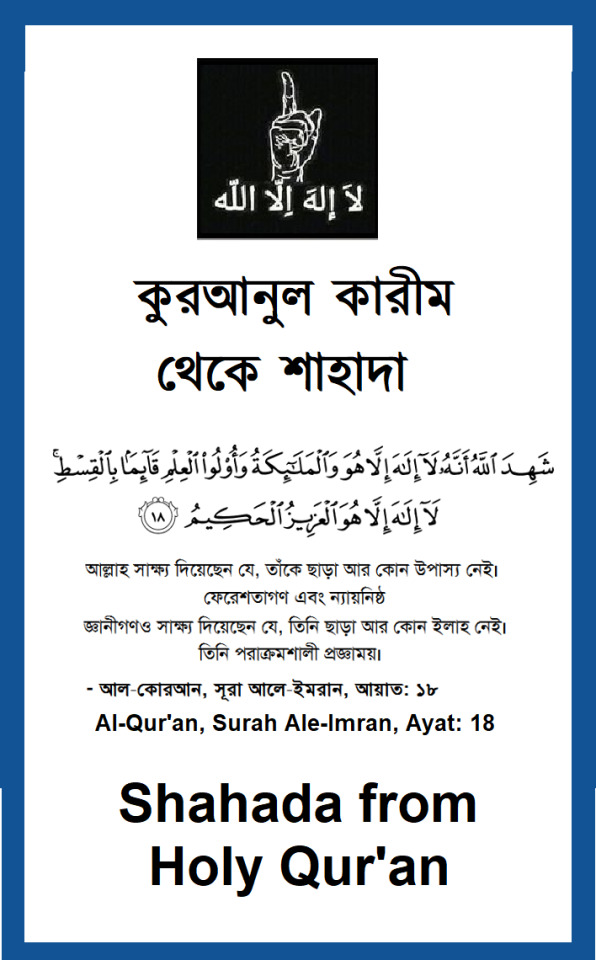


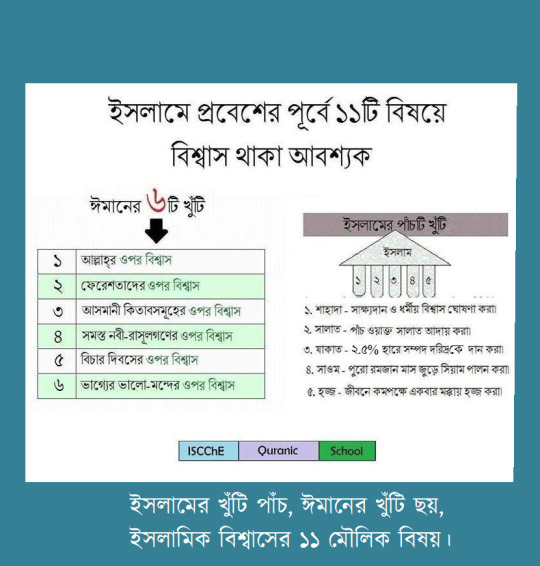






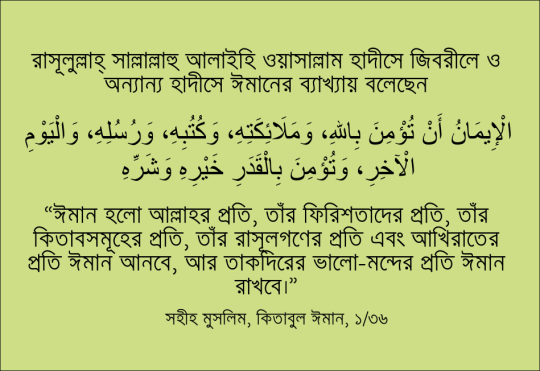



ঈমান
ঈমান (إِيمَان 'ঈমান', শাব্দিক অর্থ প্রচলিতমতে বিশ্বাস, মতান্তরে স্বীকৃতি) শব্দের আভিধানিক অর্থ স্বীকার করা, স্বীকৃতি দেওয়া, অনুগত হওয়া মতান্তরে দৃঢ় বিশ্বাস করা। এটি কুফর বা অস্বীকার করা বা অবাধ্যতার বিপরীত। ইসলাম ধর্মে ঈমানের অর্থ অত্যন্ত ব্যাপক।
ঈমান কাকে বলে? উত্তরঃ ঈমানের সাধারণ অর্থ বিশ্বাস। আর পারিভাষিক অর্থ তিন প্রকার বিষয়ের সমন্বয়ে গঠিত-
১। আততাসদিক বিলকাল্ব- অন্তরে বিশ্বাস করা বা অন্তর দ্বারা সত্যায়ন করা।
২। ওয়াল ইকরার বিললিসান- মৌখিক ভাবে স্বিকৃতি দেয়া।
৩। ওয়াল আমল বিল যাওয়ারেহ- আল্লাহর সকল বিধিবিধান যা তিনি তাঁর রাসূল মুহাম্মাদ (সাঃ) এর প্রতি ওহী করেছেন তা কমবেশ না করে মান্য করা বা আমল করা, ইত্যাদি।
ঈমানের মৌলিক ৬ স্তম্ভ
The basic 6 pillars of faith
ঈমান ঠিক না করে জীবনভর নেক আমল করলেও আখেরাতে কোনো লাভ হবে না। জিবরাঈল (আ.) আল্লাহর পক্ষ থেকে ছদ্মবেশে এসে রাসুলুল্লাহ (সা.) কে জিজ্ঞাসা করলেন, ঈমান কাকে বলে? জবাবে রাসুলুল্লাহ (সা.) বললেন, ‘ঈমানের হাকিকত বা স্বরূপ হলো, তুমি বদ্ধমূলভাবে বিশ্বাস স্থাপন করবে আল্লাহ তায়ালার প্রতি, তাঁর ফেরেশতাদের প্রতি, আসমানি কিতাবগুলোর প্রতি, আল্লাহর নবী-রাসুলদের প্রতি, কেয়ামত দিবসের প্রতি এবং তকদিরের ভালো-মন্দ সবকিছুই আল্লাহর পক্ষ থেকে নির্ধারিত হওয়ার প্রতি।’ (বোখারি : ৫০)। উল্লিখিত হাদিসটি ‘ঈমানে মুফাসসাল’ এর ভিত্তি। ঈমানে মুফাসসালে ঘোষণা করা হয়, আমি ঈমান আনলাম, ১. আল্লাহ তায়ালার প্রতি, ২. তাঁর ফেরেশতাদের প্রতি, ৩. তাঁর কিতাবগুলোর প্রতি, ৪. তাঁর নবী-রাসুলদের প্রতি, ৫. কেয়ামত দিবসের প্রতি, ৬. ভালো-মন্দ তকদিরের প্রতি
ঈমানের ৩টি মূলনীতি ও ৬টি রুকন।
কবরে তিন প্রশ্ন-পরকালের প্রথম ধাপ হলো কবর। কবরে বান্দাকে তিনটি বিশেষ প্রশ্ন করা হবে। বারা বিন আজেব (রা.) থেকে বর্ণিত, রাসুলুল্লাহ (সা.) বলেন, কবরে মানুষকে তিনটি প্রশ্ন করা হবে। এক. তোমার রব কে? দুই. তোমার দ্বিন কী? তিন. এই লোকটি কে ছিলেন, যাকে তোমাদের কাছে প্রেরণ করা হয়েছিল? কবরবাসী যদি মুমিন হয়, তাহলে এসব প্রশ্নের যথাযথ জবাব দিতে পারবে। আর যদি কাফির হয়, তাহলে বলবে, আফসোস! আমি কিছুই জানি না।’ (আবু দাউদ, হাদিস : ৪৪৫৩; তিরমিজি, হাদিস : ৩১২০)
ঈমানের উসূল কয়টি ও কি কি?
ঈমানের উসূল ৩ টি। ১। আল্লাহর মা’আরিফাত বা আল্লাহ সম্পর্কে জানা।
২। দ্বীন ইসলামের মা’আরিফাত বা দ্বীন ইসলাম সম্পর্কে জানা।
৩। আল্লাহর নবী মুহাম্মাদ (সাঃ) এর মা’আরিফাত বা নবী মুহাম্মাদ (সাঃ) সম্পর্কে জানা।
ঈমান সমগ্র দ্বীনকে অন্তর্ভুক্ত করে। ঈমান শুধু বিশ্বাসের নাম নয় ; বরং মৌখিক স্বীকৃতি ও কর্মে বাস্তবায়নের মাধ্যমে তার বাস্তব প্রতিফলনকে অপরিহার্য করে দেয়। সুতরাং ঈমানের দুটি অংশ। একটি হলো অন্তরে স্বচ্ছ আকিদা পোষণ। আরেকটি হলো বাহ্যিক তৎপরতায় তার প্রকাশ। এ দুটি পরস্পরের সঙ্গে এমনভাবে সংযুক্ত যে কোনো একটির অনুপস্থিতি ঈমানকে বিনষ্ট করে দেয়।
ইমান আরবি শব্দ। আরবি ‘আমনুন’ শব্দ থেকে এর উৎপত্তি। শব্দটির মূল অর্থ বিশ্বাস করা, স্বীকৃতি দেওয়া এবং বিশ্বস্ততা বা হৃদয়ের স্থিতি। এ ছাড়া আনুগত্য করা, শান্তি, নিরাপত্তা, অবনত হওয়া এবং আস্থা অর্থেও ইমান শব্দটি ব্যবহৃত হয়। (মুয়জামুল মাকায়িসিল লুগাহ, ১/১৩৩)
বিশ্বাস বা ধর্মবিশ্বাস বোঝাতে পবিত্র কোরআনে ও হাদিসে ইমান শব্দটি বিভিন্নভাবে ব্যবহৃত হয়েছে। আর বিশ্বাসী বোঝাতে ব্যবহৃত হয়েছে মুমিন শব্দটি।
আল্লাহতায়ালা পবিত্র কোরআনে এরশাদ করেন, ‘আর কেউ ইমান প্রত্যাখ্যান করলে তার কর্ম বিনষ্ট বা নিষ্ফল হবে এবং সে পরকালে ক্ষতিগ্রস্ত ব্যক্তিদের অন্তর্ভুক্ত হবে’ (সুরা মায়িদা, আয়াত: ৫)। আরও এরশাদ হয়েছে, ‘তিনিই তোমাদের সৃষ্টি করেছেন। আর তোমাদের মধ্যে রয়েছে কতক কাফির এবং কতক মুমিন। (সুরা তাগাবুন,
ইমান কী? ইমানের মূল পরিচয় একটি হাদিসে সহজভাবে বিবৃত হয়েছে। আবু হুরায়রা (রা.) বর্ণনা করেছেন যে একবার হজরত জিবরাইল (সা.) মানুষের বেশে রাসুলুল্লাহ (সা.)-এর সামনে এসে জিজ্ঞাসা করলেন, ‘ইমান কী? তিনি উত্তরে বলেন, আল্লাহর প্রতি, তাঁর ফেরেশতাগণের প্রতি, তাঁর পুস্তকগুলো (আসমানি কিতাব), তাঁর সাক্ষাতে, তাঁর রাসুলদের প্রতি বিশ্বাস স্থাপন করা এবং শেষ দিবসে পুনরুত্থান ও তাকদিরের প্রতি বিশ্বাস স্থাপন (করার নাম ইমান)। (বুখারি, হাদিস: ৫০)
বিভিন্ন ইমামের কাছ থেকে পরিভাষাগতভাবে ইমানের বিভিন্ন আঙ্গিকের সংজ্ঞা পাওয়া যায়। তবে সেসব সংজ্ঞার মূল বক্তব্য কাছাকাছি। ইমাম আবু হানিফা (র.) বলেছেন, ‘ইমান হচ্ছে অন্তরের সত্যায়ন ও মুখের স্বীকৃতি।’ ইমাম শাফেয়ি, মালেক ও আহমদ ইবনে হাম্বল (র.)-র মতে, ‘অন্তরের বিশ্বাস, মৌখিক স্বীকৃতি এবং আমলে বাস্তবায়ন করার নাম ইমান।’
ইমান কী? ইমানের মূল পরিচয় একটি হাদিসে সহজভাবে বিবৃত হয়েছে। আবু হুরায়রা (রা.) বর্ণনা করেছেন যে একবার জিবরাইল (সা.) মানুষের বেশে রাসুলুল্লাহ (সা.)-এর সামনে এসে জিজ্ঞাসা করলেন, ‘ইমান কী? তিনি উত্তরে বলেন, আল্লাহর প্রতি, তাঁর ফেরেশতাগণের প্রতি, তাঁর পুস্তকগুলো (আসমানি কিতাব), তাঁর সাক্ষাতে, তাঁর রাসুলদের প্রতি বিশ্বাস স্থাপন করা এবং শেষ দিবসে পুনরুত্থান ও তাকদিরের প্রতি বিশ্বাস স্থাপন (করার নাম ইমান)। (বুখারি, হাদিস: ৫০)
পবিত্র কোরআনের একাধিক আয়াত (সুরা বাকারা, আয়াত: ১৩৬, ১৭৭ ও ১৮৫; সুরা কামার, আয়াত: ৪৯; সুরা নিসা: ১৩৬) এবং হাদিসের (বুখারি, হাদিস: ১/৯৬-৯৭; মুসলিম, হাদিস আল্লাহর প্রতি বিশ্বাস, ফেরেশতাগণের প্রতি বিশ্বাস, আসমানি কিতাবসমূহের প্রতি বিশ্বাস, নবি-রাসুলগণের প্রতি বিশ্বাস, আখিরাতের প্রতি বিশ্বাস, তাকদিরের প্রতি বিশ্বাস।: ১/১৫৭) ভিত্তিতে ইমানের আরকান বা স্তম্ভ মোট ছয়টি
বিভিন্ন ইমামের কাছ থেকে পরিভাষাগতভাবে ইমানের বিভিন্ন আঙ্গিকের সংজ্ঞা পাওয়া যায়। তবে সেসব সংজ্ঞার মূল বক্তব্য কাছাকাছি। ইমাম আবু হানিফা (র.) বলেছেন, ‘ইমান হচ্ছে অন্তরের সত্যায়ন ও মুখের স্বীকৃতি।’ ইমাম শাফেয়ি, মালেক ও আহমদ ইবনে হাম্বল (র.)-র মতে, ‘অন্তরের বিশ্বাস, মৌখিক স্বীকৃতি এবং আমলে বাস্তবায়ন করার নাম ইমান।’ ছয়টি মৌলিক বিশ্বাসের সমষ্টির নাম ইমান। বিষয় ছয়টি হলো: ১. আল্লাহর প্রতি, ২. ফেরেশতাদের প্রতি, ৩. নবী-রাসুলদের প্রতি, ৪. আল্লাহ প্রেরিত কিতাবগুলোর প্রতি, ৫. পরকাল, পুনরুত্থান বা শেষ দিবসের প্রতি এবং ৬. তাকদিরের (ভাগ্য) প্রতি ইমান (বিশ্বাস স্থাপন করা) আনা।
এই ৬ টি বিষয়ের সব কটির ওপর যদি কেউ সমভাবে ইমান না আনে, তবে তাঁর ইমান পূর্ণাঙ্গ হবে না।
নবী-রাসুলদেরটি ছাড়া ইমানের অন্য সব কয়টি রোকন অদৃশ্য। আর নবী-রাসুলগণকেও এই যুগে এখন আর চোখে দেখার কোনো সুযোগ নেই। সুতরাং ইমানের সার্বিক বিষয়াবলি গায়েব বা অদৃশ্য। পবিত্র কোরআনে মুত্তাকিদের বৈশিষ্ট্য বর্ণনা করতে গিয়ে এরশাদ হয়েছে, ‘যারা অদৃশ্য বা গায়েবের প্রতি বিশ্বাস স্থাপন করে।’ (সুরা বাকারা, আয়াত: ৩) পবিত্র কোরআন ও হাদিসের আলোকে ইমান বা বিশ্বাসের ক্ষেত্রে দুটি বিষয়ে সাক্ষ্য দিতে নির্দেশ করা হয়েছে, যাকে আমরা কালিমায়ে শাহাদত নামে চিনি বা জানি।
এ কালিমার প্রথম বিষয় হচ্ছে, ‘আমি সাক্ষ্য দিচ্ছি আল্লাহ ছাড়া কোনো
'সত্য উপাস্য' বা মাবুদ নেই।’ দ্বিতীয় বিষয়টি হচ্ছে, ‘আমি আরও সাক্ষ্য দিচ্ছি, মুহাম্মাদ (সা.) আল্লাহর বান্দা ও রাসুল।’ পবিত্র কোরআন ও হাদিসের আলোকে ইমান বা বিশ্বাসের ক্ষেত্রে দুটি বিষয়ে সাক্ষ্য দিতে নির্দেশ করা হয়েছে, যাকে আমরা কালিমায়ে শাহাদত নামে চিনি বা জানি। এ কালিমার প্রথম বিষয় হচ্ছে, ‘আমি সাক্ষ্য দিচ্ছি আল্লাহ ছাড়া কোনো 'সত্য উপাস্য' বা মাবুদ নেই।’ দ্বিতীয় বিষয়টি হচ্ছে, ‘আমি আরও সাক্ষ্য দিচ্ছি, মুহাম্মাদ (সা.) আল্লাহর বান্দা ও রাসুল।’
একজন মুমিন-মুসলমানের জীবনের সবচেয়ে মূল্যবাদ সম্পদ ইমান। কারণ, ইমানহীন আমল বা কাজ মূল্যহীন বা নিষ্ফল ইমানের বিপরীত হলো কুফর বা শিরক। ইমানের স্তর ও পরিচয় নিয়ে পবিত্র কোরআন ও হাদিসে বিভিন্ন আলোচনা রয়েছে। ভালো ও নেক কাজে ইমান বাড়ে এবং পাপ ও খারাপ কাজে ইমান কমে। সে কারণে প্রত্যেক মুমিন-মুসলমানের প্রধান দায়িত্ব হলো ইমানের প্রতি যত্নবান হওয়া।
ঈমান কি?
youtube
ঈমান কাকে বলে? ঈমানের পরিচয় কী?
youtube
ঈমান কি, ঈমান কাকে বলে, ঈমানের সংঙ্গা কি
youtube
ইমানের পরিচয় ও রুকন |
youtube
ঈমান-নিয়ে তাফসীর কুরআন থেকে
https://www.youtube.com/watch?v=SrPpOCelwtQ
যেভাবে আমরা ঈমান হারাই ।
https://www.youtube.com/watch?v=SXi7B1yABPE
ঈমানের ৩টি মূলনীতি ও ৬টি রুকন
3 principles and 6 pillars of faith.
#pillars of iman#ঈমানের ৩টি মূলনীতি ও ৬টি রুকন#3 principles and 6 pillars of faith.#ঈমানের৩মূলনীতি#ঈমানের৬রুকন#ঈমানেরউসূল#3principlesoffaith#6pillarsoffaith#ঈমান#faith#Imaan#Iman#Emaan#IslamicFaith#Faith#Belief#Eman#ইমান#ইসলামিকবিশ্বাস#বিশ্বাস#Youtube
0 notes
Text






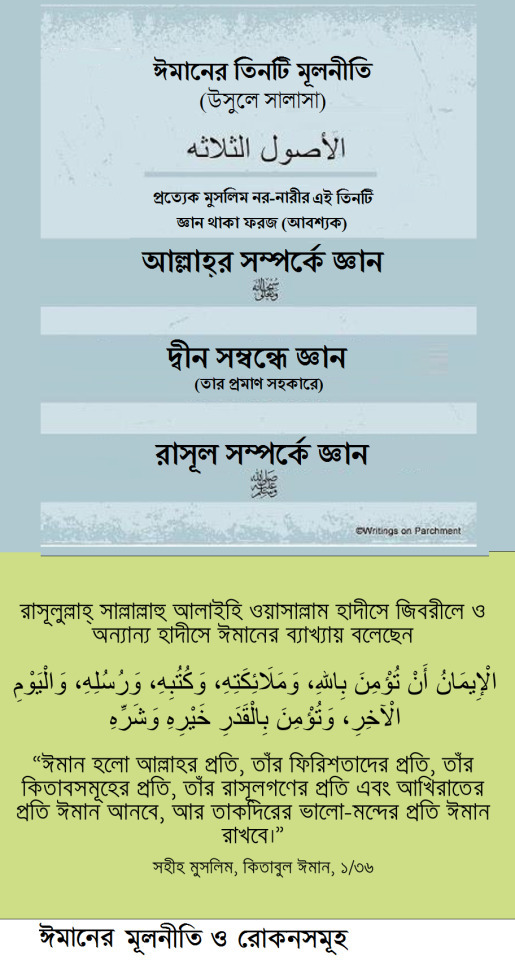





ঈমান
ঈমান (إِيمَان 'ঈমান', শাব্দিক অর্থ প্রচলিতমতে বিশ্বাস, মতান্তরে স্বীকৃতি) শব্দের আভিধানিক অর্থ স্বীকার করা, স্বীকৃতি দেওয়া, অনুগত হওয়া মতান্তরে দৃঢ় বিশ্বাস করা। এটি কুফর বা অস্বীকার করা বা অবাধ্যতার বিপরীত। ইসলাম ধর্মে ঈমানের অর্থ অত্যন্ত ব্যাপক।
ঈমান কাকে বলে? উত্তরঃ ঈমানের সাধারণ অর্থ বিশ্বাস। আর পারিভাষিক অর্থ তিন প্রকার বিষয়ের সমন্বয়ে গঠিত-
১। আততাসদিক বিলকাল্ব- অন্তরে বিশ্বাস করা বা অন্তর দ্বারা সত্যায়ন করা।
২। ওয়াল ইকরার বিললিসান- মৌখিক ভাবে স্বিকৃতি দেয়া।
৩। ওয়াল আমল বিল যাওয়ারেহ- আল্লাহর সকল বিধিবিধান যা তিনি তাঁর রাসূল মুহাম্মাদ (সাঃ) এর প্রতি ওহী করেছেন তা কমবেশ না করে মান্য করা বা আমল করা, ইত্যাদি।
ঈমানের মৌলিক ৬ স্তম্ভ
The basic 6 pillars of faith
ঈমান ঠিক না করে জীবনভর নেক আমল করলেও আখেরাতে কোনো লাভ হবে না। জিবরাঈল (আ.) আল্লাহর পক্ষ থেকে ছদ্মবেশে এসে রাসুলুল্লাহ (সা.) কে জিজ্ঞাসা করলেন, ঈমান কাকে বলে? জবাবে রাসুলুল্লাহ (সা.) বললেন, ‘ঈমানের হাকিকত বা স্বরূপ হলো, তুমি বদ্ধমূলভাবে বিশ্বাস স্থাপন করবে আল্লাহ তায়ালার প্রতি, তাঁর ফেরেশতাদের প্রতি, আসমানি কিতাবগুলোর প্রতি, আল্লাহর নবী-রাসুলদের প্রতি, কেয়ামত দিবসের প্রতি এবং তকদিরের ভালো-মন্দ সবকিছুই আল্লাহর পক্ষ থেকে নির্ধারিত হওয়ার প্রতি।’ (বোখারি : ৫০)। উল্লিখিত হাদিসটি ‘ঈমানে মুফাসসাল’ এর ভিত্তি। ঈমানে মুফাসসালে ঘোষণা করা হয়, আমি ঈমান আনলাম, ১. আল্লাহ তায়ালার প্রতি, ২. তাঁর ফেরেশতাদের প্রতি, ৩. তাঁর কিতাবগুলোর প্রতি, ৪. তাঁর নবী-রাসুলদের প্রতি, ৫. কেয়ামত দিবসের প্রতি, ৬. ভালো-মন্দ তকদিরের প্রতি
ঈমানের ৩টি মূলনীতি ও ৬টি রুকন।
কবরে তিন প্রশ্ন-পরকালের প্রথম ধাপ হলো কবর। কবরে বান্দাকে তিনটি বিশেষ প্রশ্ন করা হবে। বারা বিন আজেব (রা.) থেকে বর্ণিত, রাসুলুল্লাহ (সা.) বলেন, কবরে মানুষকে তিনটি প্রশ্ন করা হবে। এক. তোমার রব কে? দুই. তোমার দ্বিন কী? তিন. এই লোকটি কে ছিলেন, যাকে তোমাদের কাছে প্রেরণ করা হয়েছিল? কবরবাসী যদি মুমিন হয়, তাহলে এসব প্রশ্নের যথাযথ জবাব দিতে পারবে। আর যদি কাফির হ��়, তাহলে বলবে, আফসোস! আমি কিছুই জানি না।’ (আবু দাউদ, হাদিস : ৪৪৫৩; তিরমিজি, হাদিস : ৩১২০)
ঈমানের উসূল কয়টি ও কি কি?
ঈমানের উসূল ৩ টি। ১। আল্লাহর মা’আরিফাত বা আল্লাহ সম্পর্কে জানা।
২। দ্বীন ইসলামের মা’আরিফাত বা দ্বীন ইসলাম সম্পর্কে জানা।
৩। আল্লাহর নবী মুহাম্মাদ (সাঃ) এর মা’আরিফাত বা নবী মুহাম্মাদ (সাঃ) সম্পর্কে জানা।
ঈমান সমগ্র দ্বীনকে অন্তর্ভুক্ত করে। ঈমান শুধু বিশ্বাসের নাম নয় ; বরং মৌখিক স্বীকৃতি ও কর্মে বাস্তবায়নের মাধ্যমে তার বাস্তব প্রতিফলনকে অপরিহার্য করে দেয়। সুতরাং ঈমানের দুটি অংশ। একটি হলো অন্তরে স্বচ্ছ আকিদা পোষণ। আরেকটি হলো বাহ্যিক তৎপরতায় তার প্রকাশ। এ দুটি পরস্পরের সঙ্গে এমনভাবে সংযুক্ত যে কোনো একটির অনুপস্থিতি ঈমানকে বিনষ্ট করে দেয়।
ইমান আরবি শব্দ। আরবি ‘আমনুন’ শব্দ থেকে এর উৎপত্তি। শব্দটির মূল অর্থ বিশ্বাস করা, স্বীকৃতি দেওয়া এবং বিশ্বস্ততা বা হৃদয়ের স্থিতি। এ ছাড়া আনুগত্য করা, শান্তি, নিরাপত্তা, অবনত হওয়া এবং আস্থা অর্থেও ইমান শব্দটি ব্যবহৃত হয়। (মুয়জামুল মাকায়িসিল লুগাহ, ১/১৩৩)
বিশ্বাস বা ধর্মবিশ্বাস বোঝাতে পবিত্র কোরআনে ও হাদিসে ইমান শব্দটি বিভিন্নভাবে ব্যবহৃত হয়েছে। আর বিশ্বাসী বোঝাতে ব্যবহৃত হয়েছে মুমিন শব্দটি।
আল্লাহতায়ালা পবিত্র কোরআনে এরশাদ করেন, ‘আর কেউ ইমান প্রত্যাখ্যান করলে তার কর্ম বিনষ্ট বা নিষ্ফল হবে এবং সে পরকালে ক্ষতিগ্রস্ত ব্যক্তিদের অন্তর্ভুক্ত হবে’ (সুরা মায়িদা, আয়াত: ৫)। আরও এরশাদ হয়েছে, ‘তিনিই তোমাদের সৃষ্টি করেছেন। আর তোমাদের মধ্যে রয়েছে কতক কাফির এবং কতক মুমিন। (সুরা তাগাবুন,
ইমান কী? ইমানের মূল পরিচয় একটি হাদিসে সহজভাবে বিবৃত হয়েছে। আবু হুরায়রা (রা.) বর্ণনা করেছেন যে একবার হজরত জিবরাইল (সা.) মানুষের বেশে রাসুলুল্লাহ (সা.)-এর সামনে এসে জিজ্ঞাসা করলেন, ‘ইমান কী? তিনি উত্তরে বলেন, আল্লাহর প্রতি, তাঁর ফেরেশতাগণের প্রতি, তাঁর পুস্তকগুলো (আসমানি কিতাব), তাঁর সাক্ষাতে, তাঁর রাসুলদের প্রতি বিশ্বাস স্থাপন করা এবং শেষ দিবসে পুনরুত্থান ও তাকদিরের প্রতি বিশ্বাস স্থাপন (করার নাম ইমান)। (বুখারি, হাদিস: ৫০)
বিভিন্ন ইমামের কাছ থেকে পরিভাষাগতভাবে ইমানের বিভিন্ন আঙ্গিকের সংজ্ঞা পাওয়া যায়। তবে সেসব সংজ্ঞার মূল বক্তব্য কাছাকাছি। ইমাম আবু হানিফা (র.) বলেছেন, ‘ইমান হচ্ছে অন্তরের সত্যায়ন ও মুখের স্বীকৃতি।’ ইমাম শাফেয়ি, মালেক ও আহমদ ইবনে হাম্বল (র.)-র মতে, ‘অন্তরের বিশ্বাস, মৌখিক স্বীকৃতি এবং আমলে বাস্তবায়ন করার নাম ইমান।’
ইমান কী? ইমানের মূল পরিচয় একটি হাদিসে সহজভাবে বিবৃত হয়েছে। আবু হুরায়রা (রা.) বর্ণনা করেছেন যে একবার জিবরাইল (সা.) মানুষের বেশে রাসুলুল্লাহ (সা.)-এর সামনে এসে জিজ্ঞাসা করলেন, ‘ইমান কী? তিনি উত্তরে বলেন, আল্লাহর প্রতি, তাঁর ফেরেশতাগণের প্রতি, তাঁর পুস্তকগুলো (আসমানি কিতাব), তাঁর সাক্ষাতে, তাঁর রাসুলদের প্রতি বিশ্বাস স্থাপন করা এবং শেষ দিবসে পুনরুত্থান ও তাকদিরের প্রতি বিশ্বাস স্থাপন (করার নাম ইমান)। (বুখারি, হাদিস: ৫০)
পবিত্র কোরআনের একাধিক আয়াত (সুরা বাকারা, আয়াত: ১৩৬, ১৭৭ ও ১৮৫; সুরা কামার, আয়াত: ৪৯; সুরা নিসা: ১৩৬) এবং হাদিসের (বুখারি, হাদিস: ১/৯৬-৯৭; মুসলিম, হাদিস আল্লাহর প্রতি বিশ্বাস, ফেরেশতাগণের প্রতি বিশ্বাস, আসমানি কিতাবসমূহের প্রতি বিশ্বাস, নবি-রাসুলগণের প্রতি বিশ্বাস, আখিরাতের প্রতি বিশ্বাস, তাকদিরের প্রতি বিশ্বাস।: ১/১৫৭) ভিত্তিতে ইমানের আরকান বা স্তম্ভ মোট ছয়টি
বিভিন্ন ইমামের কাছ থেকে পরিভাষাগতভাবে ইমানের বিভিন্ন আঙ্গিকের সংজ্ঞা পাওয়া যায়। তবে সেসব সংজ্ঞার মূল বক্তব্য কাছাকাছি। ইমাম আবু হানিফা (র.) বলেছেন, ‘ইমান হচ্ছে অন্তরের সত্যায়ন ও মুখের স্বীকৃতি।’ ইমাম শাফেয়ি, মালেক ও আহমদ ইবনে হাম্বল (র.)-র মতে, ‘অন্তরের বিশ্বাস, মৌখিক স্বীকৃতি এবং আমলে বাস্তবায়ন করার নাম ইমান।’ ছয়টি মৌলিক বিশ্বাসের সমষ্টির নাম ইমান। বিষয় ছয়টি হলো: ১. আল্লাহর প্রতি, ২. ফেরেশতাদের প্রতি, ৩. নবী-রাসুলদের প্রতি, ৪. আল্লাহ প্রেরিত কিতাবগুলোর প্রতি, ৫. পরকাল, পুনরুত্থান বা শেষ দিবসের প্রতি এবং ৬. তাকদিরের (ভাগ্য) প্রতি ইমান (বিশ্বাস স্থাপন করা) আনা।
এই ৬ টি বিষয়ের সব কটির ওপর যদি কেউ সমভাবে ইমান না আনে, তবে তাঁর ইমান পূর্ণাঙ্গ হবে না।
নবী-রাসুলদেরটি ছাড়া ইমানের অন্য সব কয়টি রোকন অদৃশ্য। আর নবী-রাসুলগণকেও এই যুগে এখন আর চোখে দেখার কোনো সুযোগ নেই। সুতরাং ইমানের সার্বিক বিষয়াবলি গায়েব বা অদৃশ্য। পবিত্র কোরআনে মুত্তাকিদের বৈশিষ্ট্য বর্ণনা করতে গিয়ে এরশাদ হয়েছে, ‘যারা অদৃশ্য বা গায়েবের প্রতি বিশ্বাস স্থাপন করে।’ (সুরা বাকারা, আয়াত: ৩) পবিত্র কোরআন ও হাদিসের আলোকে ইমান বা বিশ্বাসের ক্ষেত্রে দুটি বিষয়ে সাক্ষ্য দিতে নির্দেশ করা হয়েছে, যাকে আমরা কালিমায়ে শাহাদত নামে চিনি বা জানি।
এ কালিমার প্রথম বিষয় হচ্ছে, ‘আমি সাক্ষ্য দিচ্ছি আল্লাহ ছাড়া কোনো
'সত্য উপাস্য' বা মাবুদ নেই।’ দ্বিতীয় বিষয়টি হচ্ছে, ‘আমি আরও সাক্ষ্য দিচ্ছি, মুহাম্মাদ (সা.) আল্লাহর বান্দা ও রাসুল।’ পবিত্র কোরআন ও হাদিসের আলোকে ইমান বা বিশ্বাসের ক্ষেত্রে দুটি বিষয়ে সাক্ষ্য দিতে নির্দেশ করা হয়েছে, যাকে আমরা কালিমায়ে শাহাদত নামে চিনি বা জানি। এ কালিমার প্রথম বিষয় হচ্ছে, ‘আমি সাক্ষ্য দিচ্ছি আল্লাহ ছাড়া কোনো 'সত্য উপাস্য' বা মাবুদ নেই।’ দ্বিতীয় বিষয়টি হচ্ছে, ‘আমি আরও সাক্ষ্য দিচ্ছি, মুহাম্মাদ (সা.) আল্লাহর বান্দা ও রাসুল।’
একজন মুমিন-মুসলমানের জীবনের সবচেয়ে মূল্যবাদ সম্পদ ইমান। কারণ, ইমানহীন আমল বা কাজ মূল্যহীন বা নিষ্ফল ইমানের বিপরীত হলো কুফর বা শিরক। ইমানের স্তর ও পরিচয় নিয়ে পবিত্র কোরআন ও হাদিসে বিভিন্ন আলোচনা রয়েছে। ভালো ও নেক কাজে ইমান বাড়ে এবং পাপ ও খারাপ কাজে ইমান কমে। সে কারণে প্রত্যেক মুমিন-মুসলমানের প্রধান দায়িত্ব হলো ইমানের প্রতি যত্নবান হওয়া।
ঈমান কি?
youtube
ঈমান কাকে বলে? ঈমানের পরিচয় কী?
youtube
ঈমান কি, ঈমান কাকে বলে, ঈমানের সংঙ্গা কি
youtube
ইমানের পরিচয় ও রুকন |
youtube
ঈমান-নিয়ে তাফসীর কুরআন থেকে
https://www.youtube.com/watch?v=SrPpOCelwtQ
যেভাবে আমরা ঈমান হারাই ।
https://www.youtube.com/watch?v=SXi7B1yABPE
ঈমানের ৩টি মূলনীতি ও ৬টি রুকন
3 principles and 6 pillars of faith.
#Imaan#Youtube#ঈমানের ৩টি মূলনীতি ও ৬টি রুকন#3 principles and 6 pillars of faith.#ঈমানের৩মূলনীতি#ঈমানের৬রুকন#ঈমানেরউসূল#3principlesoffaith#6pillarsoffaith#ঈমান#faith#Iman#Emaan#IslamicFaith#Faith#Belief#Eman#ইমান#ইসলামিকবিশ্বাস#বিশ্বাস#emaan
0 notes
Text
🍃🕊🍃 Nahjal Balagha 🍃🕊🍃
🍃 Part 1 🍃
The Sermons
Sharif Razi
🍃 Sermon 2: I praise Allah seeking completion of His Blessing...
🍃 Delivered on return from Siffin 🍃
🍃 Arabia before proclamation of Prophethood
ومن خطبة له ) عليه السلام (بعد انصرافه من صفين
وفيها حال الناس قبل البعثة وصفة آل النبي ثمّ صفة قوم آخرين:
I praise Allah seeking completion of His Blessing, submitting to His Glory and expecting safety from committing His sins. I invoke His help being in need of His Sufficiency (of protection). He whom He guides does not go astray, He with whom He is hostile gets no protection. He whom He supports does not remain needy. Praise is most weighty of all that is weighed and the most valuable of all that is treasured.
أحْمَدُهُ اسْتِتْماماً لِنِعْمَتِهِ، وَاسْتِسْلاَماً لِعِزَّتِهِ، واسْتِعْصَاماً مِنْ مَعْصِيَتِهِ، وَأَسْتَعِينُهُ فَاقَةً إِلى كِفَايَتِهِ، إِنَّهُ لاَ يَضِلُّ مَنْ هَدَاهُ، وَلا يَئِلُ مَنْ عَادَاهُ، وَلا يَفْتَقِرُ مَنْ كَفَاهُ; فَإِنَّهُ أَرْجَحُ ما وُزِنَ، وَأَفْضَلُ مَا خُزِنَ.
I stand witness that there is no god but Allah the One. He has no like. My testimony has been tested in its frankness, and its essence is our belief. We shall cling to it for ever till we live and shall store it for facing the tribulations that overtake us because it is the foundation stone of Belief (iman) and the first step towards good actions and Divine pleasure. It is the means to keep Satan away.
وَأَشْهَدُ أَنْ لاَ إِلهَ إِلاَّ اللهُ، شَهَادَةً مُمْتَحَناً إِخْلاَصُهَا، مُعْتَقَداً مُصَاصُهَا، نَتَمَسَّكُ بها أَبَداً ما أَبْقانَا، وَنَدَّخِرُهَا لاِهَاوِيلِ مَا يَلْقَانَا، فَإِنَّها عَزيمَةُ الاْيمَانِ، وَفَاتِحَةُ الاْحْسَانِ، وَمَرْضَاةُ الرَّحْمنِ، وَمَدْحَرَةُ الشَّيْطَانِ.
I also stand witness that Muhammad (S) is His slave and His Prophet. Allah sent him with the illustrious religion, effective emblem, written Book,1 effulgent light, sparkling gleam and decisive injunction in order to dispel doubts, present clear proofs, administer warning through signs and to warn of punishments. At that time people had fallen in vices whereby the rope of religion had been broken, the pillars of belief had been shaken, principles had been sacrileged, system had become topsy turvy, openings were narrow, passage was dark, guidance was unknown and darkness prevailed.
وَأَشْهَدُ أَنَّ مُحَمَّداً عَبْدُهُ وَرَسُولُهُ، أرْسَلَهُ بِالدِّينِ المشْهُورِ، وَالعَلَمِ المأْثُورِ، وَالكِتَابِ المسْطُورِ، وَالنُّورِ السَّاطِعِ، وَالضِّيَاءِ اللاَّمِعِ، وَالاَمْرِ الصَّادِعِ، إزَاحَةً لِلشُّبُهَاتِ، وَاحْتِجَاجاً بِالبَيِّنَاتِ، وَتَحْذِيراً بِالايَاتِ، وَتَخْويفاً بِالمَثُلاَتِ، وَالنَّاسُ في فِتَن انْجَذَمَ فِيها حَبْلُ الدِّينِ، وَتَزَعْزَعَتْ سَوَارِي اليَقِينِ، وَاخْتَلَفَ النَّجْرُ، وَتَشَتَّتَ الاْمْرُ، وَضَاقَ الْـمَخْرَجُ، وَعَمِيَ المَصْدَرُ، فَالهُدَى خَامِلٌ، واَلعَمَى شَامِلٌ.
Allah was being disobeyed, Satan was given support and Belief had been forsaken. As a result the pillars of religion fell down, its traces could not be discerned, its passages had been destroyed and its streets had fallen into decay. People obeyed Satan and treaded his paths. They sought water from his watering places. Through them Satan’s emblems got flying and his standard was raised in vices which trampled the people under their hoofs, and treaded upon them with their feet. The vices stood on their toes (in full stature) and the people immersed in them were strayed, perplexed, ignorant and seduced as though in a good house2 with bad neighbours. Instead of sleep they had wakefulness and for antimony they had tears in the eyes. They were in a land where the learned were in bridle (keeping their mouths shut) while the ignorant were honoured.
عُصِيَ الرَّحْمنُ، وَنُصِرَ الشَّيْطَانُ، وَخُذِلَ الاِْيمَانُ، فَانْهَارَتْ دَعَائِمُهُ، وَتَنكَّرَتْ مَعَالِمُهُ، وَدَرَسَتْ سُبُلُهُ، وَعَفَتْ شُرُكُهُ.
أَطَاعُوا الشَّيْطَانَ فَسَلَكُوا مَسَالِكَهُ، وَوَرَدُوا مَنَاهِلَهُ، بِهِمْ سَارَتْ أَعْلامُهُ، وَقَامَ لِوَاؤُهُ، في فِتَن دَاسَتْهُمْ بِأَخْفَافِهَا، وَوَطِئَتْهُمْ بأَظْلاَفِهَا وَقَامَتْ عَلَى سَنَابِكِهَا، فَهُمْ فِيهَا تَائِهُونَ حَائِرونَ جَاهِلُونَ مَفْتُونُونَ، في خَيْرِ دَار، وَشَرِّ جِيرَان، نَوْمُهُمْ سُهُودٌ، وَكُحْلُهُمْ دُمُوعٌ، بأَرْض عَالِمُها مُلْجَمٌ، وَجَاهِلُها مُكْرَمٌ.
🍃 In the same sermon Amir al-mu’minin referred to Al an-Nabi (the Household of the Holy Prophet) as under
ومنها: ويعني آل النبي ( صلى الله عليه وآله وسلم)
They are the trustees of His secrets, shelter for His affairs, source of knowledge about Him, centre of His wisdom, valleys for His books and mountains of His religion. With them Allah straightened the bend of religion’s back and removed the trembling of its limbs.
هُمْ مَوْضِعُ سِرِّهِ، وَلَجَأُ أَمْرِهِ، وَعَيْبَةُ عِلْمِهِ، وَمَوْئِلُ حُكْمِهِ، وَكُهُوفُ كُتُبِهِ، وَجِبَالُ دِينِه، بِهِمْ أَقَامَ انْحِناءَ ظَهْرِهِ، وَأذْهَبَ ارْتِعَادَ فَرَائِصِهِ.
🍃 In the same Sermon he spoke about the hypocrites
منها: يعني بها قوماً آخرين
They sowed vices, watered them with deception and harvested destruction.
زَرَعُوا الفُجُورَ، وَسَقَوْهُ الغُرُورَ، وَحَصَدُوا الثُّبُورَ ،
🍃 Ali Muhammad
آل محمد (عليه السلام)
None in the Islamic community can be taken at par with the Progeny3 of the Prophet (Ali Muhammad). One who was under their obligation cannot be matched with them. They are the foundation of religion and pillar of Belief. The forward runner has to turn back to them while the follower has to overtake them. They possess the chief characteristics for vicegerency. In their favour exists the will and succession (of the Prophet). This is the time when right has returned to its owner and diverted to its centre of return.
لا يُقَاسُ بِآلِ مُحَمَّد (عليهم السلام) مِنْ هذِهِ الاُمَّةِ أَحَدٌ، وَلا يُسَوَّى بِهِمْ مَنْ جَرَتْ نِعْمَتُهُمْ عَلَيْهِ أبَداً.
هُمْ أَسَاسُ الدِّينِ، وَعِمَادُ اليَقِينِ، إِلَيْهمْ يَفِيءُ الغَالي، وَبِهِمْ يَلْحَقُ التَّالي، وَلَهُمْ خَصَائِصُ حَقِّ الوِلايَةِ، وَفِيهِمُ الوَصِيَّةُ وَالوِرَاثَةُ، الاْنَ إِذْ رَجَعَ الحَقُّ إِلَى أَهْلِهِ، وَنُقِلَ إِلَى مُنْتَقَلِهِ.
***************************************
🍃 Alternative Sources for 🍃
🍃 Sermon 2 🍃
(1) Ibn Qutaybah, ‘Uyun, I, 326;
(2) al-Tabari, al-Mustarshid, p. 73;
(3) Ibn ‘Abd Rabbih, al-’Iqd, III, 112;
(4) al-'Amidi, Ghurar, 331, 354;
(5) Ibn Talhah, Matalib, I.
1. The Preserved Record.
2. Good House means ‘Mecca’ while the bad neighbours mean the ‘Unbelievers of Quraysh.’
3. About the Progeny of the Prophet Amir al-mu'minin has said that no person in the world can be brought at par with them, nor can any one be deemed their equal in sublimity, because the world is overladen with their obligations and has been able to secure eternal blessings only through their guidance. They are the corner stone and foundation of religion and the sustenance for its life and survival. They are such strong pillars of knowledge and belief that they can turn away the stormy flow of doubt and suspicion. They are such middle course among the paths of excess and backwardness that if some one goes far towards excess and exaggeration or falls behind then unless he comes back or steps forward to that middle course he cannot be on the path of Islam. They possess all the characteristics which give the superiority in the right for vicegerency and leadership. Consequently, no one else in the ummah enjoys the right of patronage and guardianship. That is why the Prophet declared them his vicegerents and successors. About will and succession the commentator Ibn Abi'l-Hadid Mu`tazili writes that there can be no doubt about the vicegerency of Amir al-mu'minin but succession cannot imply succession in position although the Shi`ite sect has so interpreted it. It rather implies succession of learning.
Now, if according to him succession is taken to imply succession in learning even he does not seem to succeed in achieving his object, because even by this interpretation the right of succeeding the Prophet does not devolve on any other person. When it is agreed that learning is the most essential requirement of khilafah (caliphate) because the most important functions of the Prophet's Caliph consist of dispensation of justice, solving problems of religious laws, clarifying intricacies and administration of religious penalties. If these functions are taken away from the Prophet's deputy his position will come down to that of a worldly ruler. He cannot be regarded as the pivot of religious authority. Therefore either we should keep governmental authority separate from Prophet's vicegerency or accept the successor of Prophet's knowledge to suit that position.
The interpretation of Ibn Abi'l-Hadid could be acceptable if Amir al-mu'minin had uttered this sentence alone, but observing that it was uttered soon after `Ali's (p.b.u.h.) recognition as Caliph and just after it the sentence "Right has returned to its owner" exists, this interpretation of his seems baseless. Rather, the Prophet's will cannot imply any other will except that for vicegerency and caliphate, and succession would imply not succession in property nor in knowledge because this was not an occasion to mention it here but it must mean the succession in the right leadership which stood proved as from Allah not only on the ground of kinship but on the ground of qualities of perfection.
.

#ahlulbayt#islam and shia#imam hussain#imam mahdi#fatima#imam ali#prophet muhammad#ahlulbait#fatima zahra#imam husayn
2 notes
·
View notes
Text
🇩🇪🇸🇦🇺🇲
🇸🇦 الركن الأول من أركان الإسلام:
المسلم هو الذي يشهد أن
"لا اله الا الله وأن محمد رسول الله"
بهذا التصريح البسيط يصبح المرء مسلما.👇
✅️ أَشْهَدُ أَنْ لَا إِلَٰهَ إِلَّا ٱللَّٰهُ وَأَشْهَدُ أَنَّ مُحَمَّدًا رَسُولُ ٱللَّٰهِ ✅️

🇩🇪 Die erste Säule des Islam:
Ein Muslim ist einfach jemand, der Zeugnis ablegt und bezeugt, daß “Nichts der Anbetung, Verherrlichung und Verehrung würdig ist außer Allah und Muhammad ist der Gesandte Allahs.” Durch diese einfachen Erklärung wird man ein Muslim.👇
✅️ Ich bezeuge: Es gibt keinen Gott außer Allah und ich bezeuge, dass Muhammad der Gesandte Allahs ist.✅️
🇺🇲 The First Pillar of Islam:
A Muslim is simply one who bears witness and testifies that “nothing deserves worship except Allah and Muhammad is the messenger of Allah.” One becomes a Muslim by making this simple declaration.👇
✅️ I bear witness that there is no God but Allah and I bear witness that Muhammad is the messenger of Allah.✅️
---
👉🌿 ️ašhadu ʾan lā ʾilāha ʾilla (A)llāh, wa ʾašhadu ʾanna Muḥammada(n) rasūlu (A)llāh 🌿
---
#شهادة #إسلام #محمد #عيسى #حرام #حلال #كريسماس #عيد_الميلاد #ايمان #المانيا #مسلم
#Shahada #Glaubensbekenntnis #Islam #Schahada #Jesus #moslem #Mohamed #Allah #halal #haram #Weihnachten #Christmas #Iman #Testimony_of_Faith
3 notes
·
View notes